Academic Report 2019
DSU ACADEMIC REPORT

Editor-in-Chief
Dr. Cheri Crenshaw
Lead Designer
Erin Smith
Photography Alex Santiago
PUBLICATION BOARD
Dr. Michael Lacourse
Provost and Vice President of Academic Affairs
Dr. Joy McMurrin
Assistant Professor of English
Dr. Jordon Sharp
Chief Marketing & Communication Officer
Jyl Hall Director of Public Relations
Stacy Schmidt
Public Relations/ Publications Coordinator
Jared Madsen
Creative & Visual Services
Production Manager
Scott Garrett
Design and Photography Specialist
Features 3 Human Performance Center: Accelerating DSU from Status to Stature 6 College of Science, Engineering & Technology: Mechanical Engineering Program Kicks Off, New Building in the Works 16 The First Graduate Program at DSU: Master of Accountancy 17 Kevin Barrett: DSU's Founding Father of the Baccalaureate Accounting Program 24 Atwood Innovation Plaza: The Gathering Place of Brilliance 26 Bioinformatics: Program Prepares Students for Vital, Evolving Career Field 28 Soft Cell Research: Public-Private Partnership at DSU Leads to Groundbreaking Discoveries Facult y Spotlights 14 Dr. Travis Ficklin 14 Dr. Jeremy Young 15 Dr. Rico Del Sesto 20 Dr. Sarah Bell 21 Dr. Macey Buker 49 Dr. Ace Pilkington: Prolific Scholar, Accomplished Director, Beloved English and History Professor Student Spotlights 32 Emily Flores 32 Jordyn Chambers 33 Derek Brazeau 34 Student Perspectives active learning. active life. 4 Degrees by College 8 Experiential Learning: Students Participate in Real-World Learning Activities 10 Digital and Extended Learning: Advancing the University's Online Offerings 11 Digital Forensics Crime Lab: Ahead of the Curve 12 OxySwitch: Innovation in Respiratory Therapy 13 Geographic Information Systems: Tackling Real-World Problems 18 Global Education: International Experiences Reveal New Ideas, Perspectives 19 The Train Kiln: Raw, Ancient, and Authentic 22 Art Without Borders: La Frontera Project 30 Undergraduate Research at DSU: Students Foray into the Unknown 35 Students Helping Students: SHELL Tutors Reach out to International Students 36 DSU Grants and Recognition, Publications, and Research
IN THIS REPORT
Message from the Provost

constructed, and new state-of-art equipment has been purchased to provide students with extraordinary learning experiences. Students are increasingly studying abroad, participating in faculty-led research and publishing their works, serving the community, and gaining admissions to highly ranked post-graduate programs in medicine, health sciences, business, and applied sciences.
Three years ago, we adopted a new philosophy for teaching and learning at DSU that we call “active learning. active life.” Students who attend DSU now learn mostly by doing, rather than listening. In other words, DSU students are expected and supported to make, build, design, create, compose, and produce; not to attend, sit, listen, and take notes.
It is with great pride that I present this inaugural edition of the annual Dixie State University Academic Report, highlighting and recognizing the scholarly activities, innovations, programs, and accomplishments of our students, faculty, and staff from this past year. I am particularly proud that the stories you will read have all been written by our students.

Six years ago, Utah Governor Gary Herbert officially re-designated our institution from Dixie State College to Dixie State University, allowing DSU to better serve the growing educational needs of the Southern Utah region and the state. Much has happened since that historic event and DSU is now rapidly becoming a university of first choice based on the quality of our growing academic programs.
Since becoming a university, I am proud to report that 26 new bachelor’s degree programs in science, technology, engineering, health sciences, arts, business, humanities, social sciences, and education have been added, graduate education has begun and master’s degrees are quickly being developed. More than 100 new terminally degreed faculty have been hired, facilities have been enhanced or
Students are expected to acquire new skills and knowledge in their academic area, while becoming responsible citizens and professionals who are innovative and persevere to achieve their goals. Built into each academic program of study is our general education core courses, where students acquire skills such as critical thinking, communications, collaboration, and creativity, all critical in preparing for careers in what is now being called the fourth industrial revolution. Dixie State University faculty embrace the teacher-scholar model and provide students with personal mentoring in small classes, a strategy critical to students’ learning and achieving their goals.
I invite you to explore this Academic Report, and learn more about the quality of our academic programs and faculty, as well as the extraordinary opportunities students are provided to learn by doing. I think you will be surprised to learn how much DSU has grown and changed!
Dr. Michael Lacourse Provost and Vice President of Academic Affairs michael.lacourse@dixie.edu
2 dixie.edu | active learning. active life.
Human Performance Center: Accelerating DSU from Status to Stature
by Braxton Thornley, Senior, English Major, Secondary Education Emphasis
Scheduled for completion during the fall of 2019 (with the academic wing opening in time for the beginning of the fall 2019 semester), the Human Performance Center has a large goal: marrying the students’ recreational needs with an academically engaging teaching facility.

The recreation portion of the Human Performance Center will sport over 150,000 square feet of usable space; a ten-lane, Olympic-sized pool; a 65-foot rock climbing wall; multiple running tracks; two full-sized basketball courts; four full-sized locker rooms; fitness equipment on every floor; and other state-of-the-art recreation amenities. Not only will these facilities be available for students to use on their own, but they will also facilitate many of the university’s non-academic activity classes, such as yoga and ballroom dancing.
Additionally, the Human Performance Center will boast an entire wing dedicated entirely to academics. Exercise
Science, Recreation and Sport Management, Population Health, Athletic Training, Applied Performance Kinesiology, Physical Therapy, Occupational Therapy, and Biomechanics will each be housed in the four-story wing, and have access to abundant lab space.
Susan Hart, Health and Human Performance Department Chair, notes that the new building will allow faculty to all be housed in the same location, “which is always conducive for collaboration and working with students.” Hart also emphasizes the importance of the new lab facilities: “The new building will have laboratory spaces with state-of-the-art equipment for facilitating active learning as well as research opportunities in Exercise Physiology and Biomechanics, with clinical and performance application.”
The combination of the recreation and academic spaces, Hart says, will allow the university to truly “showcase our academic programs and our activities.”
3 Academic Report 2019 | Dixie State University
The Human Performance Center, set to open during the fall 2019 semester, will house academic classrooms and labs as well as student recreation facilities.
DEGREES BY COLLEGE
DSU offers 4 master's degrees*, 45 bachelor's degrees*, 11 associate's degrees, 42 minors, 19 certificates and 67 emphases.
BUSINESS & COMMUNICATION SCIENCE, ENGINEERING & TECHNOLOGY
MASTER'S DEGREE
Accountancy
BACHELOR'S DEGREES
BS Accounting
BS Business Administration
Management Information Systems
BS Communication Studies
Applied Leadership
Health Communication
Organization & Leadership
BS Finance
BS Information Systems & Analytics
BA/BS Marketing
BS Media Studies
Broadcasting
Multimedia Journalism
Public Relations
Social Media
ASSOCIATE'S DEGREES
AAS General Technology: Business
MINORS
Accounting
Communication Studies
Economics
Management
Marketing
Media Studies
BACHELOR'S DEGREES & EMPHASES
BS Applied and Computational Mathematics
Actuarial Science
Data Analytics
Scientific Computing
BS Bioinformatics
BS Biology
Biology Education
Biological Sciences
Biomedical Sciences
Natural Sciences
BS Biology with Integrated Science
BS Chemistry
BS Computer Science
BS Computer & Information Technology
Information Technology
Software Development
Web Design & Development
BA/BS Design
Digital Design
Graphic Design
Interaction Design
BA/BS Mathematics
BA/BS Mathematics Education
BS Mechanical Engineering
BS Molecular Biology-Biochemistry
BS Physical Science Composite Teaching
ASSOCIATE'S DEGREES
Associate of Pre-Engineering
DIXIE STATE UNIVERSITY MINORS
Biology
ASSOCIATE'S DEGREE Biology Education
AA/AS General Studies
Chemistry
Chemistry Education
HUMANITIES & SOCIAL SCIENCES
MASTER'S DEGREES
Marriage & Family Therapy *
Technical Writing & Digital Rhetoric
BACHELOR'S DEGREES & EMPHASES
BA/BS Applied Sociology
BA/BS English
Creative Writing
English Education
Literary Studies
Professional & Technical Writing
BA/BS History
History and Social Science Teaching
BA/BS Psychology
BA Spanish
Spanish Education
BA/BS Criminal Justice
Criminology
Digital Defense and Security
ASSOCIATE'S DEGREES
AS Criminal Justice
MINORS
American Sign Language
Creative Writing
Criminology
Digital Defense and Security
English Education
General English
Global Studies
Health Psychology
Computer Science
Digital Design
Information Tech.
Web Design & Dev.
Mathematics Physics *
Mathematics Ed.
History
Humanities & Philosophy
Nonprofit Management
Professional & Technical Writing
Psychology
Sociology
Social Justice
Spanish
* Pending approval
4 dixie.edu | active learning. active life.
CERTIFICATES
ASSOCIATE'S
5 Academic Report 2019 | Dixie State University EDUCATION HEALTH SCIENCES ARTS BACHELOR'S DEGREES & EMPHASES MASTER'S DEGREE BACHELOR'S DEGREES & EMPHASES BS Elementary Education Athletic Training BA/BS Art Bachelor of Individualized Studies Art Education Integrated Studies BACHELOR'S DEGREES & EMPHASES Entertainment/Arts/Animation Dance BS Dental Hygiene Painting / Drawing/Illustration Music BS Exercise Science Photography / Digital Imagery Theater Pre-Occupational Therapy 3-D / Sculpture / Ceramics Art Pre-Physical Therapy BFA Studio Art Digital Film Production BAS Health Sciences * Bachelor of Music in Performance Recreation Management BS Medical Laboratory Science BA/BS Dance Health Care Administration BS Nursing BS Digital Film Public Health BS Population Health BA/BS Music Long Term Care Administration Health Care Administration BS Music Education Management Long Term Care Administration BA/BS Theatre Marketing Public Health BA/BS Theatre Education Business BS Recreation & Sport Management Media Studies Experience Industry Management MINORS Communication Studies Corporate Recreation & Wellness Art Criminal Justice Sport Management Art History English Dance History ASSOCIATE'S DEGREES Music Psychology AAS Emergency Medical Services Photography Sociology AAS Medical Radiography Theatre Spanish AAS Physical Therapist Assistant American Sign Language Interpreter AAS Respiratory Therapy Humanities & Philosophy AAS Surgical Technology Global Studies Chemistry MINORS Earth Science Public Health Mathematical Science Healthcare Administration Biology Long Term Care Administration Computer Science
Technology
Design and Development
Design Information
Web
Early Childhood Education
Early Childhood Education
Pending approval
DEGREES AAS
AA/AS
*
&
Utah Math Paramedic Social Research Methods Elementary STEM Phlebotomy Strategic Communication ESL Proficiency Media Production Biotechnology Secondary Ed. Licensure Multimedia Journalism Computing Fundamentals Advanced Emergency Medical Tech. Professional Writing Design Emergency Medical Technician Retail Management Maker Nurse Assistant Social Media General Education
ENDORSEMENTS
College of Science, Engineering, & Technology: Mechanical Engineering Program Kicks Off, New Building in the Works
by Autumn Nuzman, Sophomore, English Major, Creative Writing Emphasis, Sociology Minor
In the fall of 2018, DSU started its Mechanical Engineering program. This exciting new program offers a Maker Certificate, an Associate of Science in Pre-Engineering (APE), and a Bachelor of Science in Mechanical Engineering (BSME).
“The best thing about these degrees is that they stack onto each other,” said David Christensen, Assistant Professor of Mechanical Engineering. The Maker Certificate focuses on 12.5 credits of coding and design classes, all of which can be applied toward the APE degree, and classes from the APE degree can be applied toward the BSME degree.
Christensen said, “[As part of the Maker Certificate, students] learn how to design 3D objects in the computer using SolidWorks. They learn how to design linkages, gear trains, and cams. They also learn to prototype their designs using various machines and processes such as 3D printers, laser cutters, CNC machines, vinyl cutters, injection
molding, vacuum forming, welding, casting, electroplating, composite laying, and post-processing techniques for 3D prints. They even learn to program microcontrollers to take data from sensors, process that data, and move motors. Essentially, students learn to take their ideas and make a prototype.”
The Mechanical Engineering program has a heavy focus on robotics, also known as mechatronics, and manufacturing. On April 23, 2019, engineering and maker students will showcase their knowledge and abilities in these areas at Dixie Design Day with activities such as a robotic golf demonstration.
The robotic golf demonstration is part of the freshman project attached to MECH 1200/1205 and involves students teaming up to design and prototype robotic obstacles that interact with the golf ball in order to provide an entertaining experience for golfers. Each team starts with three
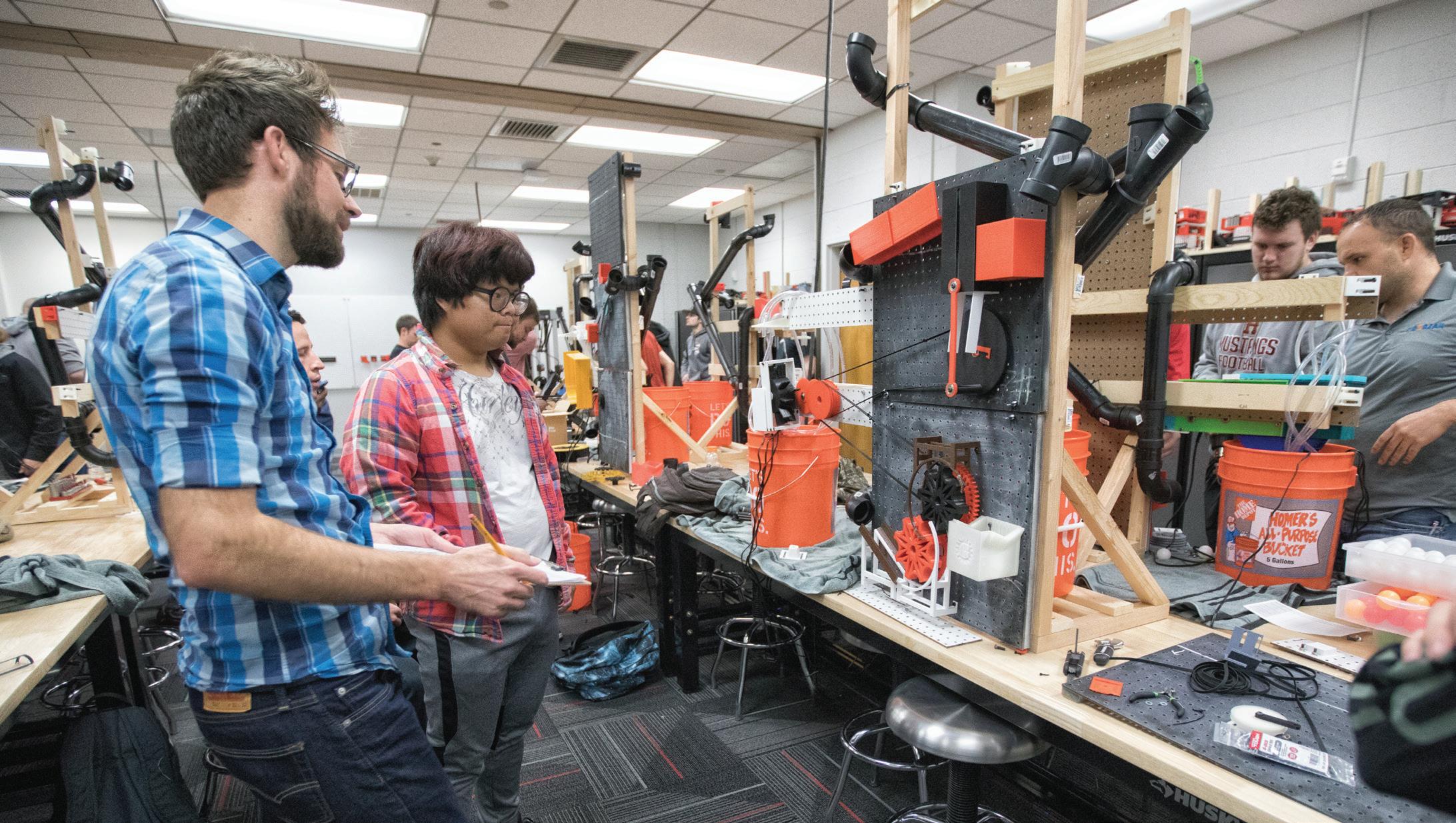
6 dixie.edu | Features
Assistant Professor of Mechanical Engineering Dr. David Christensen helps students with a project in the prototyping and coding lab.
modular and customizable mini golf course panels with modular terrain, and each sub-team is assigned to a panel. Each team must arrange the panels and terrain to form a mini golf course hole and agree on a cohesive theme to which the obstacles of each sub-team must conform.
Christensen said, “As an example, a sub-team with a seashore or bay theme could prototype a continuously rocking ship that launches the golf ball out of its cannon if the golf ball reaches the ship’s deck. On Dixie Design Day, the public will be invited to play on and rate the miniature golf courses.”
For final project competitions at the end of the semester, students work in teams of four to design and prototype a water-powered conveyor system to move game balls from pipe 1 to the goal. The conveyor system is comprised of four subsystems: a water power converter, mechanism one, mechanism two, and mechanism three.
The water power converter captures the energy from water being pumped from the water bucket with a water wheel or turbine to turn a three-stage gear train. The gear train attaches to and powers mechanisms 1, 2, and 3 via a timing belt. Mechanisms 1, 2, and 3 move the game ball from pipe 1 to pipe 2, pipe 2 to pipe 3, and pipe 3 to the goal bucket, respectively.
A lot of expansion has occurred within the program and some of it is still ongoing. For instance, the prototyping
and coding lab, introduced in the spring of 2019, is home to 23 3D printers and was expanded over winter break with soldering stations for MECH 1200/1205.
“We acquired 11 3D printers prior to spring 2018 and 12 more prior to fall 2018,” Christensen said.“3D printers are one of the many tools that makers and engineers use to prototype.”
These 3D printers aren’t just used for making engineering-related projects, though. Some students have made more artistic objects such as vases and topographical maps of the Grand Canyon and Idaho.
In the fall of 2019, a circuits lab will be added that houses equipment such as oscilloscopes, function generators, power supplies, and bench-top digital multimeters. The capabilities of this lab will be expanded in spring 2020 with data acquisition units and comprehensive materials testers.
Also, a new Science, Engineering, & Technology (SET) building is currently being designed and if the Utah Legislature appropriates funding to the project, construction is anticipated to begin in the fall of 2019. The SET building will be home to engineering, biology, chemistry, physics, and geology labs and classrooms.
Exciting new things are in the works for DSU’s Mechanical Engineering program, and all of the classes in the Maker Certificate are open to students of any major as well as to the public.
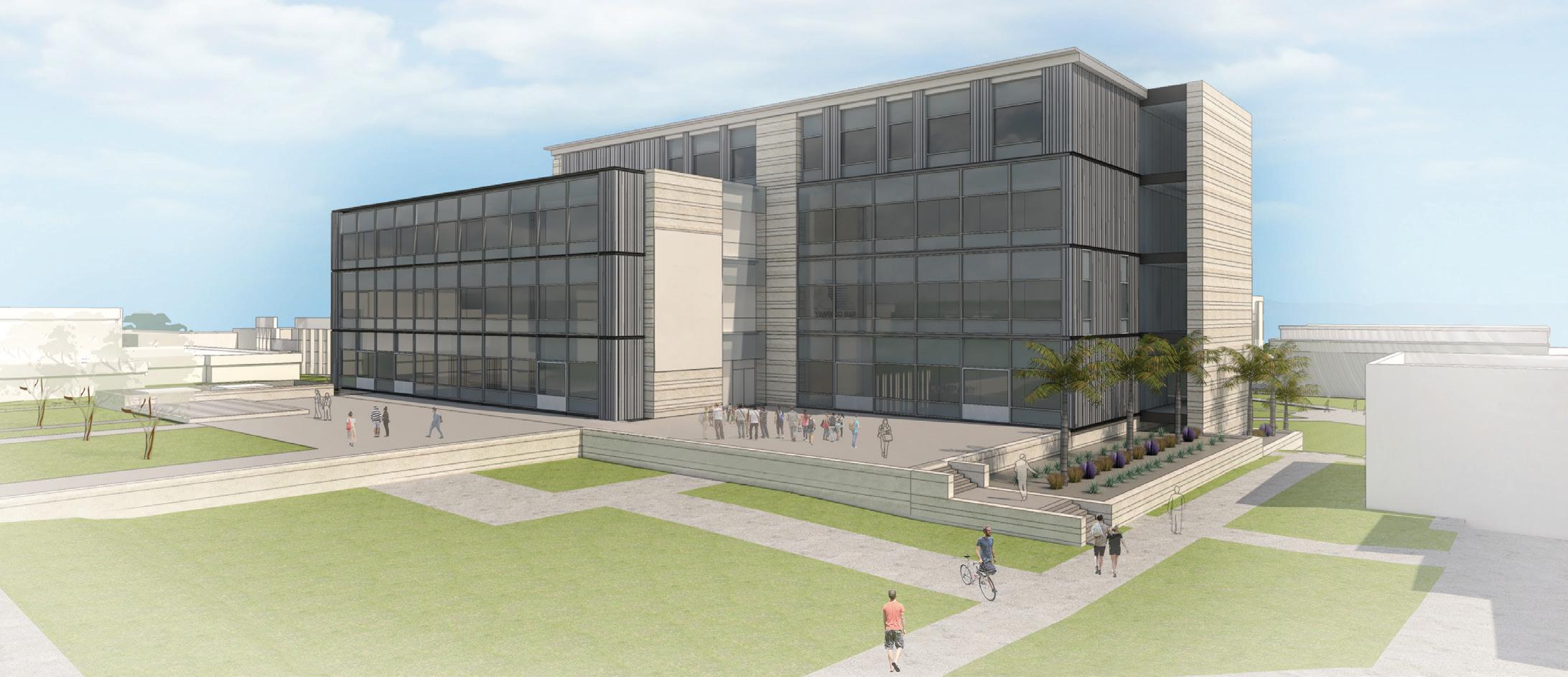
7 Academic Report 2019 | Dixie State University
DSU has asked the Utah State Legislature for funding to build a Science, Engineering & Technology building to house the University's growing programs.
EXPERIENTIAL LEARNING: Students Participate in Real-World Learning Activities
by Brooke Garceau, Senior, English Major, Professional and Technical Writing Emphasis
The tagline “active learning. active life.” encompasses the goals, expectations, and pursuits of Dixie State University faculty and students. Departments across campus have embraced active, or experiential, learning in their classrooms, in our community, and around the world.
Dr. Kelly Bringhurst, Director of Community Engaged Learning at DSU, says that “experiential education provides opportunities for students to participate and learn from experiences that mirror activities that are similar to real-world activities.” He also says that reflecting on those experiences “transforms a simple experience to a learning experience.”
Accounting students help community members file their taxes free of charge every year through the volunteer Income Tax Assistance program. Students in Human Development courses volunteer at DSU’s on-site preschool several times throughout the semester, working with the kids and learning about their development in this stage of life. Film and media students work with professors to produce videos for DSU’s Marketing Department and commercials for private clients. Nursing students volunteer at St. George’s homeless shelter, Switchpoint, providing basic checkups and vaccines for underprivileged citizens in the community. Students in the English Department write grants on behalf of nonprofit organizations, publish poetry, short stories, and newsworthy articles, and create podcasts and documentaries from start to finish.
In the Science Department, faculty strive to provide as many real-world experiences as possible for their students. In basic geology courses, students take six-hour field trips around
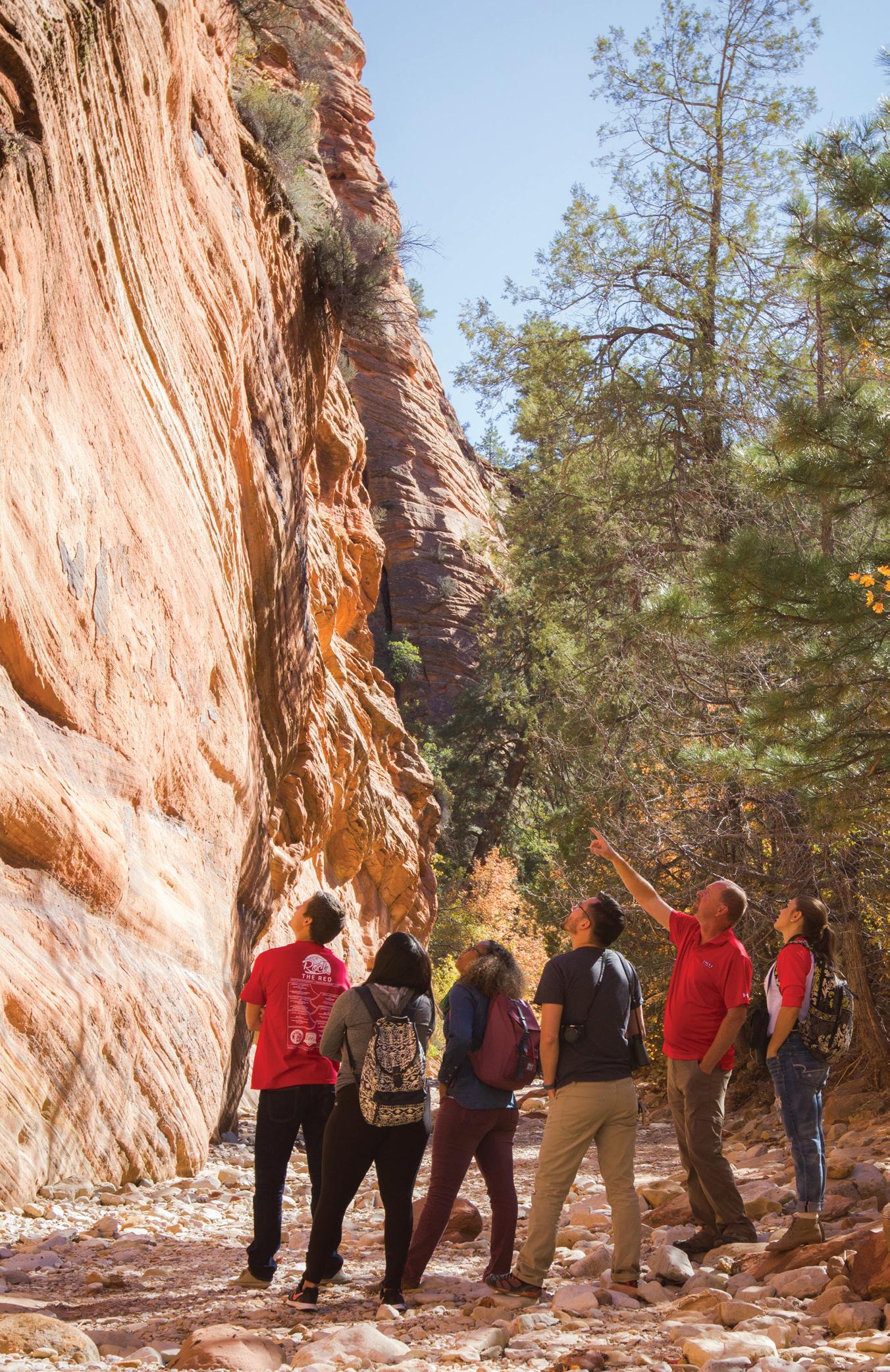
8 dixie.edu | active learning. active life.
Dr. Kelly Bringhurst leads students on an experiential learning field trip at Zion National Park.
St. George during the semester to study the layers in red sandstone or the dinosaur tracks near the Virgin River. Students in introductory biology courses explore Zion National Park with their professor, studying animal habitats, different forms of plant life, and water quality.
Other students take special excursions to Catalina Island where they study environmental science. In the first year that Bringhurst took a class to Catalina Island, none of his 30 students were considering a career in science. After their hands-on experiences testing and comparing water quality in rural and urban areas and studying colorful oceandwellers, six decided to pursue careers in oceanography or marine biology. In addition, seven students from that original class returned to Catalina Island to serve as youth mentors at science camps on the island.
This kind of professional development and service to others results from the reflective process students go through after participating in experiential learning experiences like this. Students feel excited about what they’re learning when they see it applied in real situations and realize how powerfully they can influence others for good when they use the skills their college education provides.
In the Spanish Department, students plan a special activity each year where they, their peers, and students from local high schools can actively practice their Spanish. They set up a miniature town with pretend shops and restaurants where students play language games and interact with “shopkeepers” using only Spanish. A volunteer police officer even “arrests” anyone caught speaking English throughout the day. To escape jail and return to the fun, students must complete challenges like correctly conjugating a Spanish verb.
If only for a few hours, everyone involved experiences full immersion into a Spanish-speaking world, expediting the learning process. The students who help plan and put on the activity also gain valuable organizational and teaching skills that can easily transfer to any career.
Upper-division Spanish students participated in another incredible career-building experience in January of 2019. The students traveled to Yucatan, Mexico to interpret for patients and physical therapy doctoral students from Wheeling Jesuit University in West Virginia and were supervised and mentored by Dr. Luis Arévalo, Assistant Professor and Director of Global Education. Arévalo started taking students with him on this trip three years ago. The students spend seven days translating and teaching the physical therapy students to speak enough Spanish to run their own sessions.
Arévalo says that these trips provide students both professional and global humanities insights. One student who translated on a previous trip knew she wanted to study medicine and decided to pursue physical therapy after seeing the therapists working so closely with patients and improving their lives. Her experiential learning narrowed and illuminated her career path.
Many other students, whether on volunteer trips or study abroad excursions, feel overwhelmed by the humility of the people they meet. They often shed tears during those first days when they see the poverty of the people they have come to serve and learn from. As time goes on, they find themselves connecting with the people and in awe of their innovation and powerful culture.
At DSU, active, experiential learning combines crucial skills like respecting other cultures and volunteering to serve people in need with more obvious professional pursuits like committing to a field of study. Students who embrace active learning prepare to live active lives. They contribute to their communities in powerful ways, both professional and personal.
9 Academic Report 2019 | Dixie State University
“Experiential education provides opportunities for students to participate and learn from experiences that mirror activities that are similar to real-world activities.”
-Dr. Kelly Bringhurst
DIGITAL AND EXTENDED LEARNING: Advancing the University's Online Offerings
by Amy Greene, Senior, English Major, Emphasis in Secondary Education
Created in January 2017, the Office of Digital & Extended Learning at Dixie State University has a vision of “advancing, promoting, and developing digital offerings at the university,” says director Ryan Hobbs.
Despite working in rather uncharted territory, Hobbs’ passion for expanding our school’s academic reach is evident in the list of accomplishments and goals he has created for himself and his team. Hobbs recognizes that online learning is “a space that the university is still trying to figure out,” but he believes that doing so will give Dixie State University an “opportunity to do some things in a different way than other institutions.”
Instead of offering digital learning in traditional ways like many other institutions, Hobbs aspires to provide innovative online and blended courses for every type of student that chooses to attend DSU.
“Life isn’t semester-based,” says Hobbs, “and learning shouldn’t be either.” This idea drives Hobbs toward the goal of repackaging services and learning opportunities in a way that would make them available to students around the clock, on campus or online.
Dixie took a huge step toward its goal of a modified learning environment this year with the introduction of the first online degree completion program for registered nurses in need of their Bachelor of Science in Nursing. The increase of online degrees and services is important to everyone at DSU because Dixie’s many nontraditional students would benefit from the flexibility that these opportunities would allow.
Hobbs estimates that “30,000 people in Washington County alone have started college but don’t have a degree, and these people have become a main focus of the university.”
Along with his team, Hobbs is continuing to work on offering a variety of degrees online, including the first Bachelor of Applied Science in the state of Utah. This BAS in Health Sciences is designed to foster management and leadership skills in those already in the healthcare workforce. By forming partnerships with businesses in the community, current employees will be sure to feel the benefits of DSU’s new programs.
DSU’s future seems bright in Ryan Hobbs’ view, having the potential for “visionary and active leadership” with the ideas that he has brought to the table. The university is already looking ahead to 2025, with aims to focus on “active learning” as much as it focuses on “active life.”

10 dixie.edu | active learning. active life.
Ryan Hobbs, Director for the Office of Digital and Extended Learning
Digital Forensics Crime Lab: Ahead of the Curve
 by Emily Mildenhall, Junior, English Major, Professional and Technical Writing Emphasis
by Emily Mildenhall, Junior, English Major, Professional and Technical Writing Emphasis
Since being established 8 years ago, the Digital Forensics Crime Lab (DFCL) at DSU has been recognized for its specialization in mobile device research and work on live investigative cases. As both a stand-alone unit and a part of the College of Humanities & Social Sciences, the DFCL is available to students and law enforcement alike.
According to director Mark Spooner, the lab works on 700-800 cases per year (some international) and has completed cases from about 40 different states. While the lab primarily is known for its breakthroughs on cell phones, it has also started to explore automobile forensics, information from drones, home assistants such as Alexa and Amazon Echo, and cybersecurity.
According to Spooner, the lab is “expanding a lot and we’re always very busy. We attend most major conferences—we’ve even exhibited at the International Association of Chiefs of Police (IACP) Conference before and we’ll be exhibiting there again next year. For a little school, we’re pretty well known.”
In 2010, Dixie State University received a $1 million earmark from the federal government that funded the DFCL building, a state-of-the-art evidence facility, and continuously upgraded equipment.
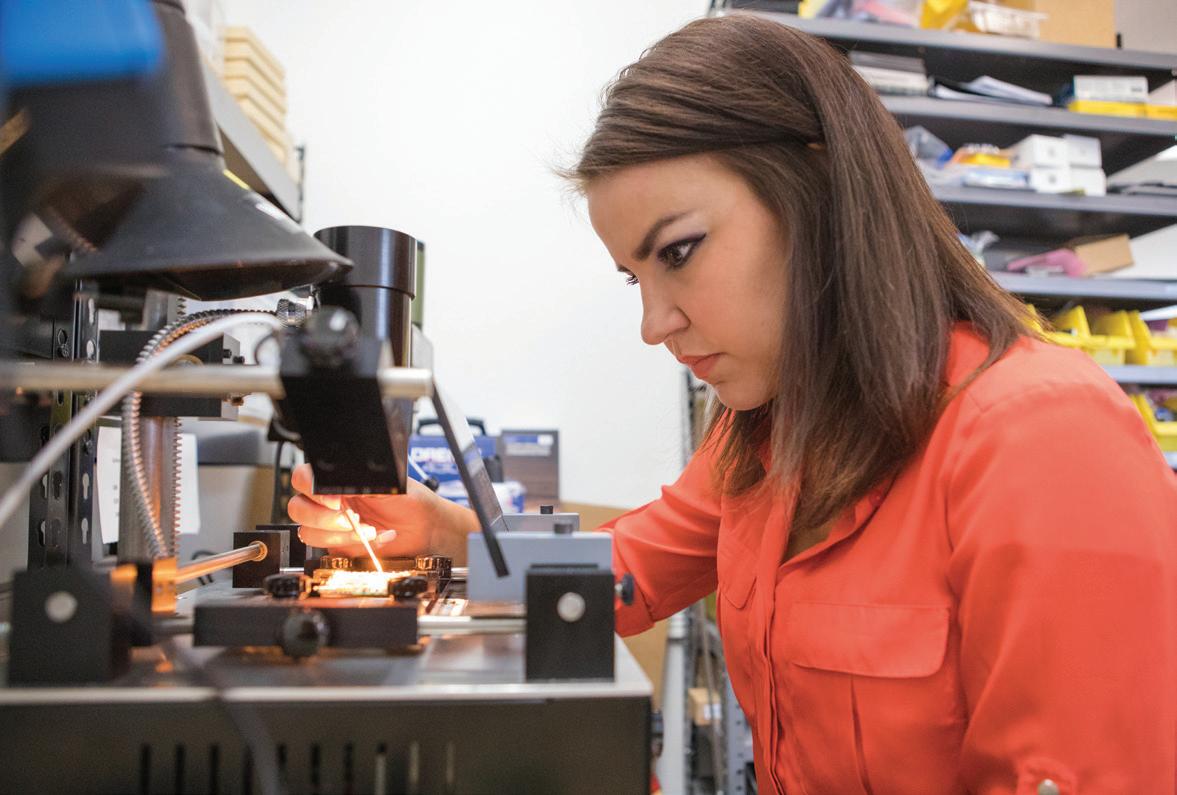
One machine the lab uses, called a Chip-Off, helps safely remove desoldered memory chips from cellular phones. A more recent addition to the lab is a new password breaker specifically for computers. Joan Runs Through, the Com-
puter Crime Institute Assistant Director, specializes in using such equipment and adapting to new technologies. Runs Through says, “For the first five years, it was mostly ChipOffs used on phones, but cell phones change pretty often. A lot of them are starting to use encryption, so they have to be shorted out as they start up, instead.” Runs Through also teaches Digital Forensics classes in the lab geared toward Criminal Justice and Information Technology majors.
As crime in technology continues to advance, the Dixie State University Digital Forensics Crime Lab continues to stay ahead of the curve.
11 Academic Report 2019 | Dixie State University
A DSU student uses Chip-Off technology in the Digital Forensics Crime Lab.
OxySwitch: Innovation in Respiratory Therapy
by Lizzie Cawley, Senior, English Major, Literature Emphasis
Faculty at Dixie State University's Atwood Innovation Plaza are empowering and supporting students’ ideas by supplying them with guidance, solutions, and resources to build thriving businesses to market viable ideas.
After mentoring students in Las Vegas and founding Teens Kicking Cancer, Dr. Wayne Provost, Director of Innovation Guidance Solutions, moved to St. George to continue to devote his life to helping others. He has retired five times, yet with his experience building businesses based on patents he applied for, he is continually drawn to helping students develop their ideas into practical businesses. Being an innovator for over 45 years has only increased his desire to help.
Students who approach Provost with an idea are treated with enthusiasm, advice, and legal protection. After researching to see if it is commercially available and make sure it hasn’t been developed before, Provost checks for a patent. If there isn’t one, he works with the student to build a prototype and tries to patent it immediately.
DSU alumna Majere Wintch designed the OxySwitch, to enhance respiratory therapy. During a crisis, the appli-
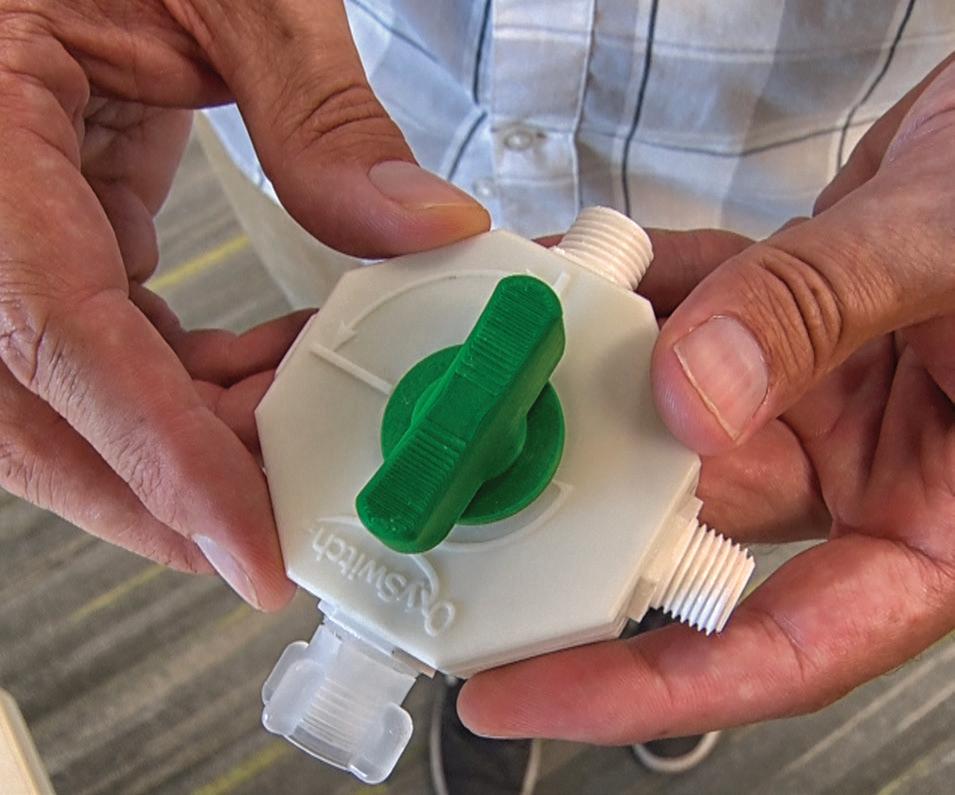
ance will switch from one respiratory source to another in an instant without requiring a therapist to change the gear. Currently, if oxygen levels drop, the delivery system has to be changed manually. With OxySwitch, the change is instantaneous—a therapist can switch from a canula to a mask immediately. “We built the prototype and have proof that it works. We did a demonstration with therapists at Intermountain Healthcare, and they loved it,” said Provost. The respiratory specialists consider it incredibly innovative.
The team is currently waiting for the approval of the patent; they hope to receive it in a few months. Provost said, “It’s a great idea. It’s so simple but nobody has ever thought about it.” Detailed information about the mechanism is limited due to the pending patent, but Wintch has a mentor who is financially helping her build the company. The acceptance of Wintch’s invention is phenomenal.
Provost strives to help students believe in themselves and pursue their ideas. In his 24 months at Dixie State, he has helped file 83 patents—25 are from students and five are from faculty and the rest are from community members. Committed to the philosophy that “there’s no such thing as a stupid idea,” faculty members encourage students to think creatively and problem-solve to build sustainable businesses.
Within this short period, 11 businesses have started from those patents. Provost notes that all students from every academic discipline are welcome and encouraged to participate and work toward a patent. Innovation Plaza is not just for technology students. Everybody has good ideas, and athletes, English majors, and dance students are applying for patents as well.
OxySwitch, and the potential it has to alter respiratory therapy, is a direct result of state-of-the-art collaboration between Wintch and the faculty members at Innovation Plaza. Striving for success and tangible results, Provost works with students to foster a safe, productive environment to pursue their ideas.
12 dixie.edu | active learning. active life.
DSU Alumna Majere Wintch invented the OxySwitch with the help of Atwood Innovation Plaza faculty.
Geographic Information Systems: Tackling Real-World Problems
by Parker Bridges, Junior, Business Major, Management Information System Emphasis
Geographic Information Systems (GIS) are frameworks for gathering and analyzing the infrastructures that permeate our daily lives. We rely on GIS for GPS navigation, weather forecasts, and seismic predictions. The applications for GIS seem endless, and now Dixie State University students have the opportunity to learn how to capture, manage, and analyze spatial or geographic data using GIS technologies. Dr. Zhenyu Jin, Visiting Assistant Professor of Geography, teaches two introductory courses in GIS.

Jin explains that, as the name suggests, GIS has three components: geography, information, and system. Geography, in this sense, simply means location, anything from a highway, to a campus building, to the middle of the desert. The next component is information, which is any attribute the location has, such as the speed limit of a road, when a building was last renovated, or the average nightly temperature of a desert. The final component, the system, is a way to store the geographic information data. Combining these three components creates a spatial database with visualization and spatial analysis.
A spatial database, the first functioning aspect of GIS, refers to how the geography and information data is stored and organized within the computer. The spatial database allows users to visualize the data. The visualization tools simplify complex data and thus facilitate better informed, more efficient decisions. The final aspect of GIS—analysis—makes it useful and versatile. Spatial analysis tools operate with and analyze the geographic data to gather new, useful information to help people solve an array of real-world problems.
Because the applications for GIS are so broad, Jin said GIS is a useful tool for nearly any discipline. GIS provides a different perspective to see the world from and a new approach to solving problems. GIS is not only useful for geographers and geologists, but also for healthcare professionals, environmental scientists, property developers, and more. For example, mapped data can help healthcare professionals better understand outbreaks and help sociologists understand human behavior. One of Jin’s previous
students, Hugo Angeles, an engineer-in-training said, “[Jin’s] vast experience and knowledge have helped me to achieve a great deal of understanding for [GIS’s] use and…endless possibilities to solve complex problems in my industry.”
Anyone interested in learning the foundations of GIS can enroll in Jin’s concurrent two-part course: Introduction to Geographic Information Systems (GEO 3600) and the lab (GEO 3605). In the lecture (3600), students learn the basic principles and concepts of GIS, such as the basic data model used by the system. Students also learn spatial analysis so that data can be properly entered into the system and manipulated to provide relevant and useful information. The lecture works hand-in-hand with the lab (3605), which is a weekly project-based, intensive three-hour block during which students tackle real-world scenarios. Initially, students learn the basic techniques, such as operating the software, and then build up to proposing a real-world problem and solving it with GIS. The goal of the class is to provide students with another tool to tackle real world problems as they move forward in their education and careers.
13 Academic Report 2019 | Dixie State University
A Geographic Information Systems (GIS) image of the St. George area
Dr. Travis Ficklin: Innovative Biomechanics Lab Promotes Research, Gives Students an Edge
by Sallie Sullivan, Senior, English Major, Secondary Education Emphasis
For most undergraduates, researching in a lab is just a dream. But thanks to Dr. Travis Ficklin, this dream has become a reality for many of his students at DSU. Shortly after coming to Dixie, Ficklin created an informal research group known as the Biomechanics and Sports Science Lab, or BASS. BASS enables students to receive guidance on research projects, collect data, and perform statistical analyses.
Through BASS, Ficklin helps students study the mechanics of hitting and pitching in softball and baseball, sprint mechanics, Olympic weightlifting, and rock climbing. Embracing Dixie’s “active learning. active life.” motto Ficklin feels that “one of the best ways to participate
in active learning is to conduct your own research, collect your own data, and then present your findings.” Several of his students have presented at undergraduate and national research conferences.
BASS also gives students an edge when applying for graduate school. These students “distinguish themselves above others,” Ficklin explains. “It is unique for undergraduates to get to work this closely with faculty and to be able to do this level of research.” Former student Sutherland Wyatt says Ficklin was “incredibly impactful in my educational journey. I would not be in physical therapy school without his continual encouragement to push my limits of knowledge.” Because of her experience with BASS, Macy Urrutia was offered a graduate student assistantship at Northern Arizona University. Ficklin and his students are anxiously awaiting the completion of Dixie’s Human Performance Center, which will give BASS a state-of-the-art lab space.
Dr. Jeremy Young: Taking to Twitter to Share Insights on the Angry Mob
by Braxton Thornley, Senior, English Major, Secondary Education Emphasis
Dr. Jeremy Young knows a thing or two about angry mobs—or at least about the use of the term as a political bludgeon. As an Assistant Professor of History and Political Science, Young has seen the term deployed throughout American politics.
For this reason, when President Trump used the term during the Brett Kavanaugh hearings to describe his appointee’s accusers—and the accusers’ supporters—Young felt the need to weigh in. Ultimately, this “weighing in” resulted in Young writing his third op-ed for The Washington Post
But The Post isn’t Young’s only platform; he also sports over 9,000 followers and wide recognition on Twitter. Last January when Young tweeted about a potential presidential run by Oprah Winfrey, he received over 1,500 likes
and a re-tweet from Nate Silver of 538. And when the Kavanaugh hearings began to build into a crescendo, Young’s insights garnered nearly 11,500 re-tweets and over 26,000 likes.
Young’s work also exists in more academic realms. Having recently published a book through Cambridge University Press titled The Age of Charisma: Leaders, Followers, and Emotions in American Society, 1870-1940, Young is quick to note that his popular work and his academic work are just two pieces of who he is as an individual.
Perhaps most notably, though, Young sees himself as more than an expert and a scholar. He also sees himself as a teacher: “[Dixie State] is a very good fit for me. I really enjoy the opportunity to work closely with undergraduate students… this is a school where many students are very hungry for knowledge and very interested in learning.”
And although Young believes that “weighing in is a part of [his] teaching mission,” he’s quick to note that he keeps “partisanship out of the classroom.”
Follow Jeremy Young on Twitter: @jeremycyoung
14 dixie.edu | Faculty Spotlights
FACULTY SPOTLIGHTS
Dr. Rico Del Sesto: A Chemistry Professor in His Element
by Brittany Bennett, Senior, History and English Major, Literature Emphasis
Entering his seventh year of teaching at Dixie State University, Dr. Rico Del Sesto, Associate Professor of Chemistry and former Boston native, has much to show for time spent in the western U.S. An active campus community organizer, instructor, and mentor with plenty of hands-on experience in his field, Del Sesto describes himself first and foremost as a collaborator.
A chemist by training, Del Sesto spends most of his teaching hours instructing students in organic chemistry offered as physical science course sequences. Completing this coursework is required for most science majors and students pursuing careers in clinical medicine, dentistry, veterinary science, or pharmacy.
He is also keen to point out that students possess individualized skill sets that instructors do not necessarily instill in them. As an instructor, he feels obligated to help students by showing them how to tap into their own capabilities. He admits that most students in his courses will not acquire an in-depth knowledge of organic chemistry, but points out that “what they do need to know is more of a situational awareness. So rather than memorizing information, they can approach a situation and analyze it from many different perspectives to come up with the best solution for each scenario.”
Del Sesto also serves as the Director of the Undergraduate Research Committee at DSU. Passionate about experiential learning and invested in supporting students throughout the research process, he says, “With research… there is no textbook, there are no guidelines.”
Before 2012, Del Sesto worked at the Los Alamos National Laboratory in New Mexico where he pursued ongoing independent research projects and experiments with direct, real-world
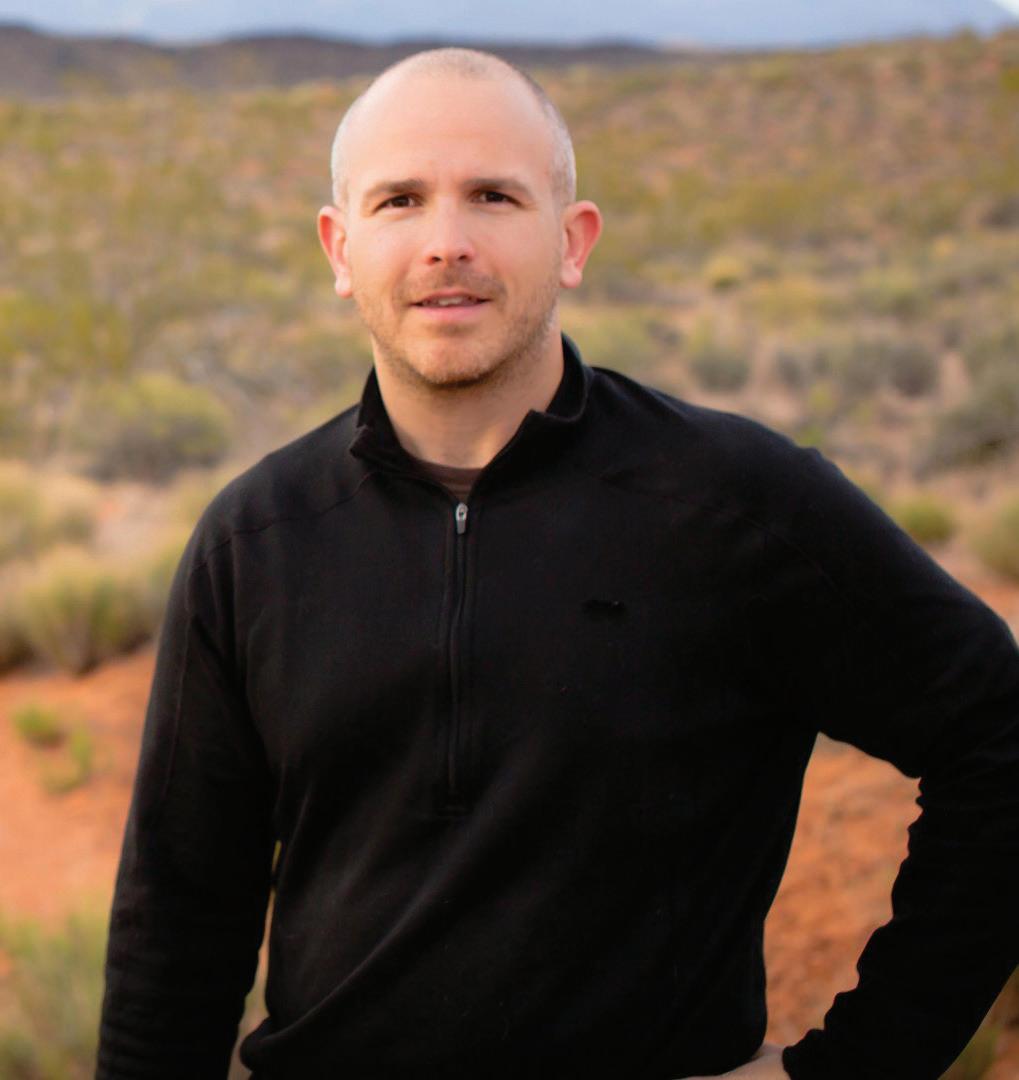
applications. Through this experience, he found that progressing in research endeavors is the result of self-determination, access to the correct tools, and confidence in oneself.
He finds this attitude of self-determination more relevant than ever in his recent teaching and research experiences at DSU. “Students don’t know what to expect, and when they ask me questions I don’t know the answers to, it’s eye-opening for them to both explore something that’s new but also for them to realize that I don’t have the answers either.”
Earlier in 2018, Del Sesto received a grant from the state initiative Utah Science Technology and Research to develop an antimicrobial treatment for methicillin-resistant Staphylococcus aureus . A physical science grant of this nature is the first one received at DSU and marks a shift in the young four-year university’s trajectory. The products of his efforts will no doubt continue to manifest during his time at DSU.
15 Academic Report 2019 | Dixie State University
The First Graduate Program at DSU: Master of Accountancy
by Emily Mildenhall, Junior, English Major, Professional and Technical Writing Emphasis
In January 2018, the Board of Trustees at DSU approved the first graduate program: a Master of Accountancy. The first group of 23 students enrolled in Fall 2018, and 5 more have registered for Spring 2019. Approximately 16 students will graduate in time to participate in the May Commencement Ceremony.
The 30-credit degree provides a necessary foundation for accounting careers in public and private sectors, including classes on financial statement modeling, leadership, teaching theory and fundamental principles, and taxes. The Accounting Department is creating more courses to add to the program, such as Forensic Accounting and Data Analytics.
After successful completion of the degree, students may become Certified Public Accountants (CPAs) and/or Certified Management Accountants (CMAs) through passing the required exams. Moreover, certification as a Certified Fraud Examiner (CFE) or a Certified Internal Auditor (CIA) is also possible with a Master of Accountancy.
In honor of the approval of the new degree, 200 red and white balloons were released outside after the board meeting, and Dr. Kyle Wells, Dean of the College of Business & Communication, led a Master’s hood signing to commemorate the event.
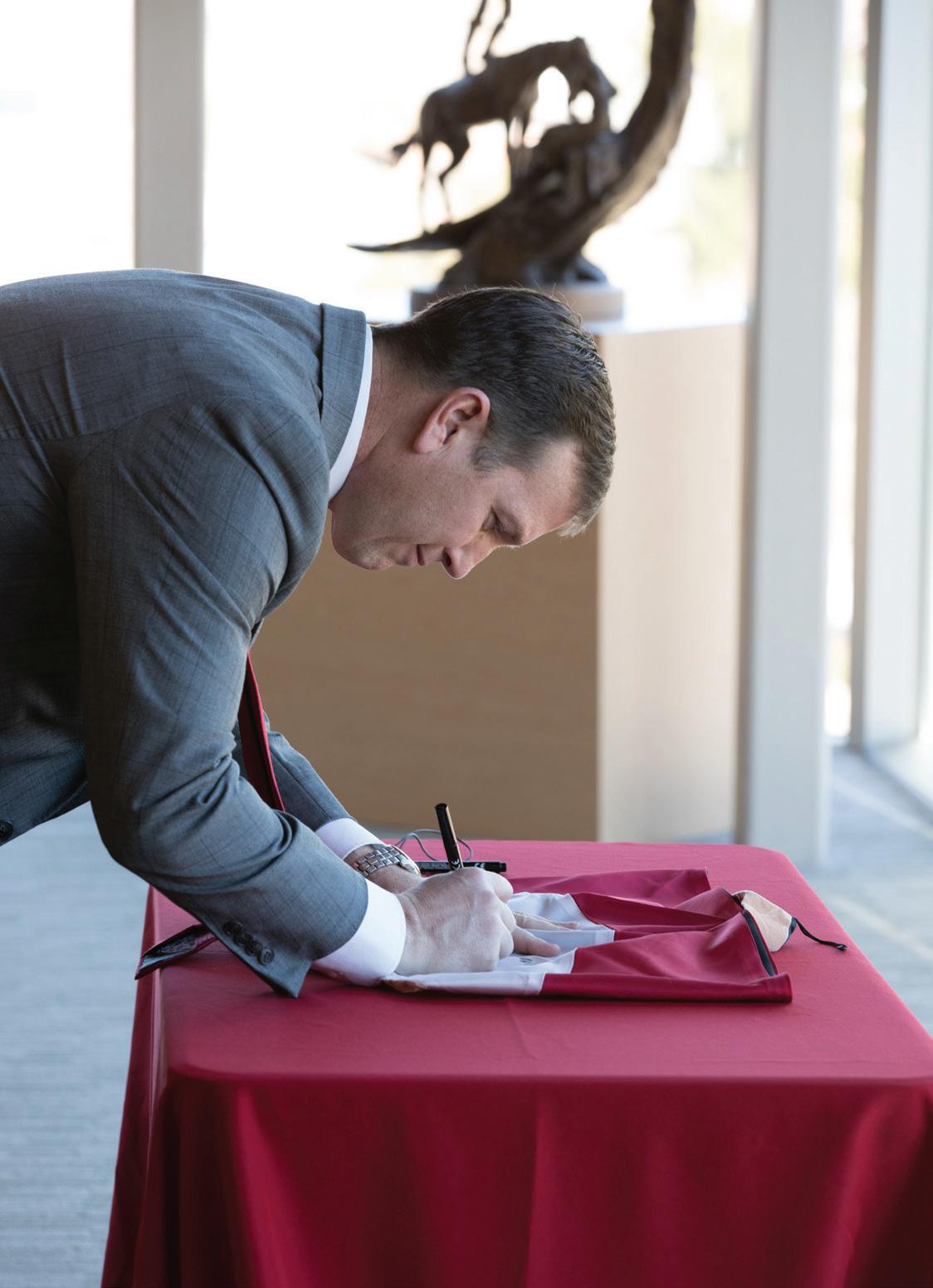
In addition to the new graduate program, DSU built a new Accounting Lab in memory of Dr. Kevin Barrett, a teacher who dedicated his life to students and the field.
The development of the program involved a great deal of input from experts in accounting, specifically from the Accounting Education Advisory Board, which is made up of local, regional, and national representation. Such collaborations determine the curriculum, culture, and academic environment for the program. One crucial member on the Accounting Education Advisory Board is Dr. Steve Albrecht,
16 dixie.edu | Features
President Richard B. Williams signs a Master of Accountancy hood in honor of the Board of Trustees approving the university's first graduate program.
an Andersen Alumni Professor of Accountancy at BYU. As a member of the board and a CPA, CIA, and CFE, he was particularly instrumental in assisting with the advancement of the Master in Accountancy degree.
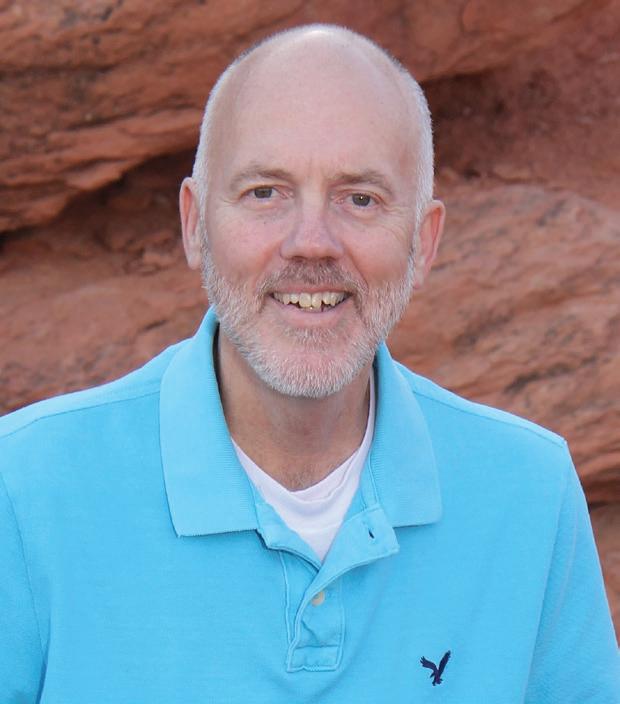
This new program is not only significant to DSU as an institution, but also to accounting as a field of practice. According to Dr. Nate L. Staheli, the Department Chair for Accounting, there is high demand for accountants with a limited supply, and more students have been wanting to get their Master’s degree in the subject. Staheli said, “In accounting, the day-to-day recording of economic events, much of it has become automated. As it gets into new frontiers with new technology, white collar crime gains momentum, like with stolen credit cards and bank information, and that’s another place where people need good accountants. Accountants must have an understanding of how to interpret the data and communicate it to the users, like with bank statements, and in doing that, they can help develop strategies to improve in the areas where it’s needed. In essence, it really is just quantitative story telling.”
While the Master of Accountancy is only in its first year, it has great potential to grow and thrive at DSU. The program is taking steps needed to meet the criteria for AACSB (Association to Advance Collegiate Schools of Business) Accreditation, a gold standard for accreditation in the academic community.
The graduate program for Accounting is a momentous achievement for DSU, paving the way for more graduate programs to come.
DR. KEVIN BARRETT: DSU’s Founding Father of the Baccalaureate Accounting Program
by Jullianna Franco, Senior, Communication Major
Honoring the founding father of Dixie State’s four-year accounting program, the College of Business & Communication dedicated the renovated Accounting Lab to late Professor Kevin Barrett, who passed away on June 30, 2017.
Dr. Barrett’s love for his students started in 2002, when he began his tenure at the university. He was instrumental in establishing DSU’s baccalaureate accounting degree. During this time, he always expected the best from his students and taught in innovative ways. In fact, Barrett’s teaching style earned him the university’s Teacher of the Year honor in 2012.
Barrett also served the community for more than 10 years by running the Volunteer Individual Tax Assistance program with his students to offer community members free tax preparation assistance every spring.
During the ribbon-cutting ceremony that took place immediately after the Board of Trustees approved the Master of Accountancy program, Barrett’s wife Venna said, “Kevin would have loved this because he loved Dixie, and he especially loved his students.”
17 Academic Report 2019 | Dixie State University
Global Education: International Experiences Reveal New Ideas, Perspectives
By Emma D. Lee, Senior, English Major, Professional and Technical Writing Emphasis
A global perspective is quickly becoming a required trait to stay competitive in the modern job market. Because of advancements in technology, industries are becoming more international, and relations between different countries across the globe are becoming more interdependent. Although the U.S. has historically maintained an inwardlooking perspective, that is beginning to change.
As a result, Dixie State is making steps toward becoming a campus that fosters opportunities for globalization of its students. Dr. Luis Arévalo, the Director of Global Education at DSU, notes, “We are living in different times. Those who don’t have global ideas and perspectives on life will be competing with those who already have that under their belts.” The Global Engagement Committee has been working toward exposing students to global ideas and perspectives using a few different modes, the most important being the increase of offered courses that include these themes.
In addition to creating courses that specifically correlate with global education, the inclusion of global themes in general education is equally—if not more—important. For example, a general education biology course might already be concerned with an outbreak of a rare and deadly disease overseas, and they may discuss the microbiology and the risks associated, but what about the implications? Travel becomes dangerous, commerce may get bogged down, and relations between governments may get a little dicey. These what-if scenarios are teaching students to think more globally and to think about how events in their communities affects others across the world and vice versa.
To equip faculty to teach global perspectives, the Global Engagement Committee has been creating contacts and forming relationships with universities abroad. Currently, DSU has contacts with the Ministry of Technology in Costa Rica, Universidad Católica de Los Angeles de Chimbote (ULADECH) in Peru, the Autonomous University of Baja, California in Mexico, and Meijo University in Japan, among
many others. These relationships facilitate the exchange of faculty, allowing professors to go abroad for teaching opportunities where they are able to expand their own horizons, form bonds with colleagues, and explore research opportunities with the hope that they will be able to return to these places abroad with students.
Students also have opportunities to go abroad, whether for cultural immersion, research opportunities, or service trips. For instance, Arévalo soon will lead a service trip to Mexico. For the last nine years, Arévalo has been visiting a clinic for the economically disadvantaged in the Yucatan. Every year, he and a group of language students accompany a group of physical therapy and medical students from Wheeling Jesuit University to act as interpreters in the clinic.

18 dixie.edu | active learning. active life.
Dr. Luis Arévalo translates between a Wheeling Jesuit Physical Therapy student and a patient on an international trip.
The Train Kiln: Raw, Ancient, and Authentic
by Trissie Cox, Senior, English Major, Secondary Education Emphasis
The Art Department at Dixie State University blazes a new trail as it adds a “train kiln,” named to reflect its form, to its creative arsenal. The train-kiln resembles the front of a traditional steam locomotive. This innovative wood-fired kiln is modern in design but achieves the same aesthetic firing qualities as the ancient Japanese Anagama kiln, a 5th century “cave” kiln, in which the ash from the wood actually glazes the pottery. The process is arduous and time consuming, but every piece comes out with a uniquely distinct design that makes these pieces highly coveted. The train kiln not only benefits DSU, but it also benefits the art students who get to make these timeless pieces.
Dixie State University is one of only two universities in Utah that uses the train kiln method of pottery making. Glen Blakley, Professor of Ceramics at DSU, says that
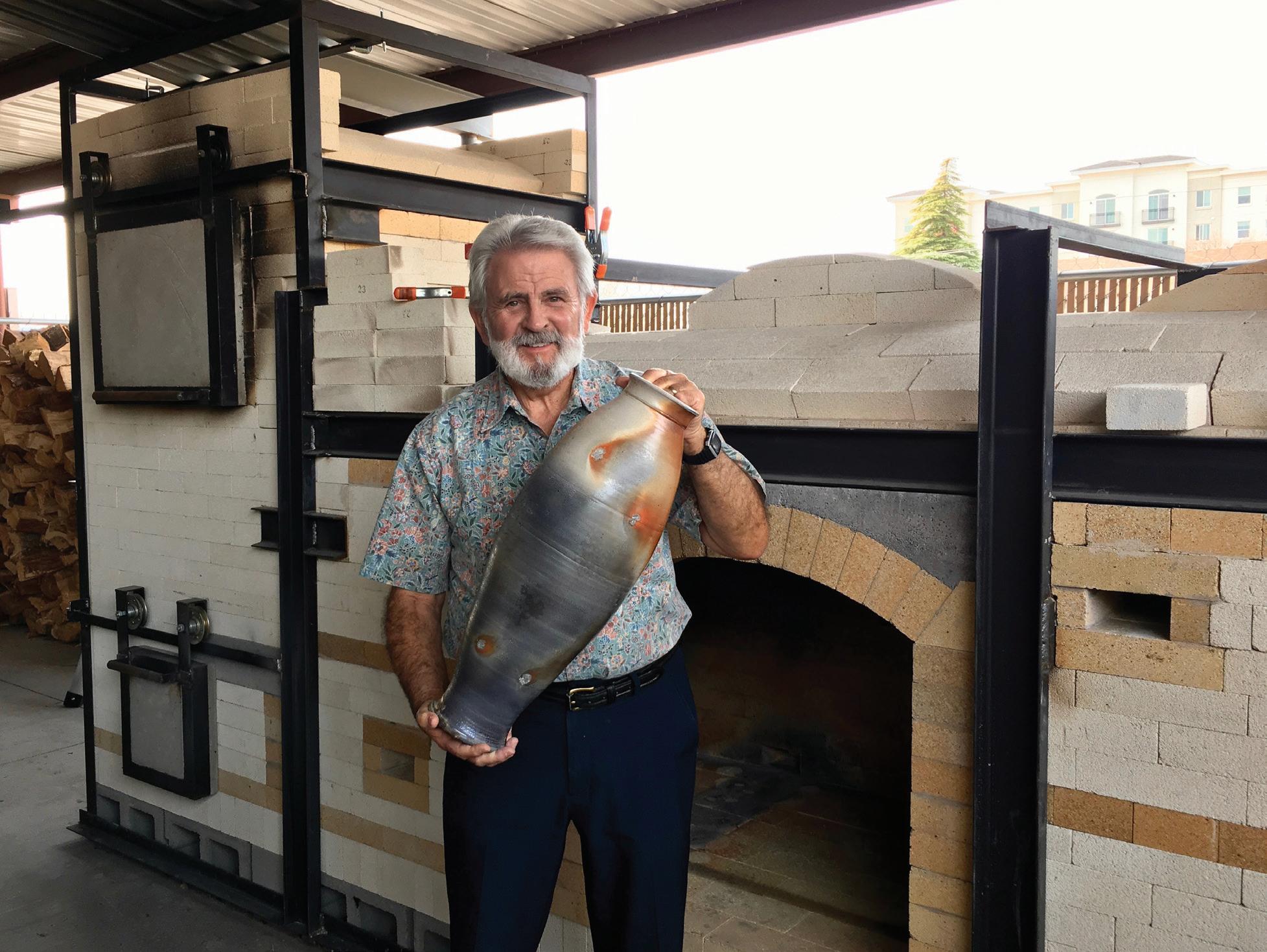
this mode of pottery making will be added to the program and will have a “big impact on the ceramic program for years to come.”
The exclusive experience of making such an exceptional piece of pottery gives students a sense of accomplishment, appreciation, and pride as they work around the clock for days to create something raw, ancient, and authentic. The experience teaches students about culture, provides a bonding experience, and adds an impressive highlight on their résumés or in their portfolios.
Blakley described the experience as “a fantasy; much like going to Disneyland for the first time.” He goes on to say that “the students camped out for the 37 hours it took to fire the pottery and made s’mores by the fire light. Working together and being successful in this endeavor creates a memory to last a lifetime.”
19 Academic Report 2019 | Dixie State University
Professor of Ceramics Glen Blakley displays a piece that has been fired in DSU's new train kiln.
Dr. Sarah Bell: Destigmatizing Sex
by Krista Kirkham, Senior, English Major, Creative Writing Emphasis
Sarah Bell is an Assistant Professor of Psychology at Dixie State University and a northern Utah native. In 2011, she graduated Summa Cum Laude with her bachelor’s degree from the University of Utah. In 2018, she graduated with a Ph.D. in Psychology and Women’s Studies from the University of Michigan. Bell teaches a wide variety of psychology classes on campus including health psychology, psychology of gender, and sexuality in a diverse society. “Some students have a lot of sexual health questions,” Bell says. “Maybe because they just haven’t had someone to ask.” She uses her classroom as a place to answer these questions with scientific facts.
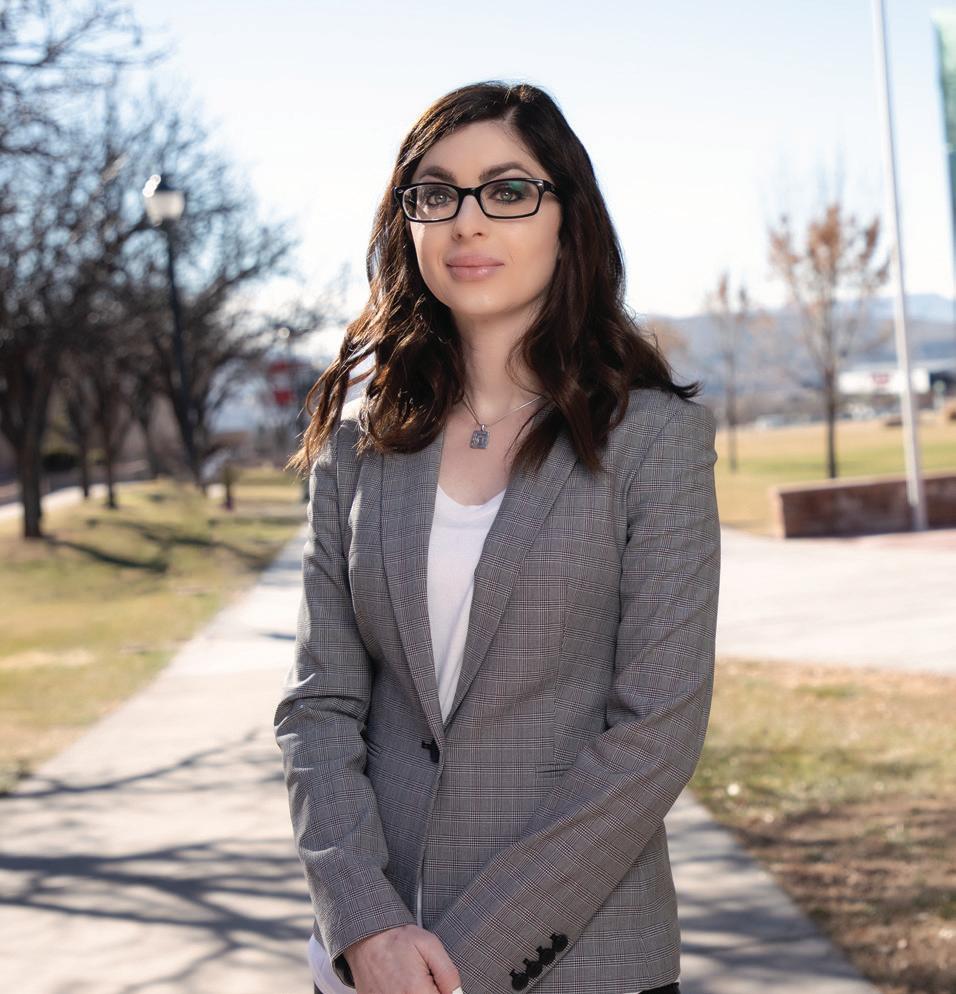
Bell has always loved to teach, but she is also a passionate researcher. The majority of her research is focused on the sexual health and sexuality of women, which she says “is at times a taboo topic,” especially in Utah. Bell did her dissertation on women’s hook-ups in college, studying what they got out of this specific type of interaction. Despite public misconception, her research is “not as extreme as it seems” and does not involve working with couples or observing sexual relationships. She considers herself primarily a qualitative researcher, typically gathering her data from interviews and analyzing it for patterns and themes. “Rather than looking at numbers,” she says, “you’re looking at an experience.” Bell’s findings were recently published in the Journal of Sex Research. In the near future, she hopes to publish a piece from her dissertation.
“As a culture,” Bell says, “we are comfortable talking about men’s sexuality but not women’s.” Because it is so stigmatized by society, Bell believes that women’s sexuality deserves more exploration and legitimate scientific research. Her personal research methods allow women’s individual voices to be heard while also revealing patterns and themes in the way our society perceives female sexuality. While it may not always be easy to discuss, Bell believes that her research is relevant because “it is
important for women at any college to be able to reflect on their own sexuality.”
With a dual Ph.D. in Psychology and Women’s Studies, Bell has found that the two disciplines work very well together. “Psychology does a lot of measuring in regards to gender differences,” Bell explains. “Women’s Studies gives you the theory to think about those measurements.” In the future, Bell would love to see a Women’s Studies program at Dixie State.
Bell structures her classes in a way that encourages class discussion and helps students relate concepts to their own lives. “As psychology research shows,” she says, “if you can relate something to your life, you’ll remember it better.” This concept, called the self-reference effect, is something she always considers when teaching. Bell believes that class discussions not only encourage her students to remember information, but also help them “process it more deeply” than they would in a lecture setting.
20 dixie.edu | Faculty Spotlights
NEW FACULTY
SPOTLIGHTS
Dr. Macey Buker: Bridging the Healthcare Gap
by Krista Kirkham, Senior, English Major, Creative Writing Emphasis
and complex revenue cycle and management of healthcare organizations” and to see where changes can be made.
In the healthcare industry, Buker finds a common gap of clinical knowledge in management positions. “The skillset you need to supervise and manage people,” he says, “is very different from a clinical skillset.” In the short time that Buker has been at Dixie State, he has already implemented new programs to help bridge this gap.
Macey Buker is an Assistant Professor of Population Health in Dixie State’s Health and Human Performance Department. Buker has a Master’s and Ph.D. in Health Care Administration, but his first graduate degree was actually in accounting. He started his college education as a pre-med major but changed to a business path, where he discovered his passion for numbers. As an accountant, he did a lot of work consulting in the health care industry, and eventually he found that his calling was not as a clinician or an accountant–but somewhere in between.
“The healthcare industry is not sustainable the way it is,” Buker says. “We’ve got to do something different.” He believes that by understanding the business and numbers aspect of the healthcare industry, we create a more sustainable future. Because of his strong background in accounting, Buker is better able to understand the “unique
When Buker first arrived, there were two bachelor emphases in Population Health, one in Public Health and the other in Healthcare Administration. Thanks to his work, Dixie State is now in the process of implementing a third emphasis in Long-Term Care. “There are only 14 accredited programs for Long-Term Care,” he says. In most states, the educational requirements for a Long-Term Care Facility Administrator include 1,000 hours of experience under a licensed facility administrator, a bachelor’s degree, and a national exam. Students in Dixie’s Long-Term Care program will accumulate the required hours through an internship and take the national exam as part of their curriculum. After graduation, students “can immediately get their Long-Term Care Facility License,” Buker says and start earning money in their desired field. These jobs not only pay well, but are in high demand. Buker notes that between now and 2050, administrator roles in the Long-Term Care industry are projected to grow at a rate of 27% a year.
More than anything, Buker considers himself to be a student advocate. “It doesn’t matter what you do—life happens,” he says, “and I try to put myself into the position of my students and be more flexible when it does.” Rather than basing most of his curriculum on lectures, which he feels are often inadequate, Buker tries to run his classes in an interactive way to increase student engagement.
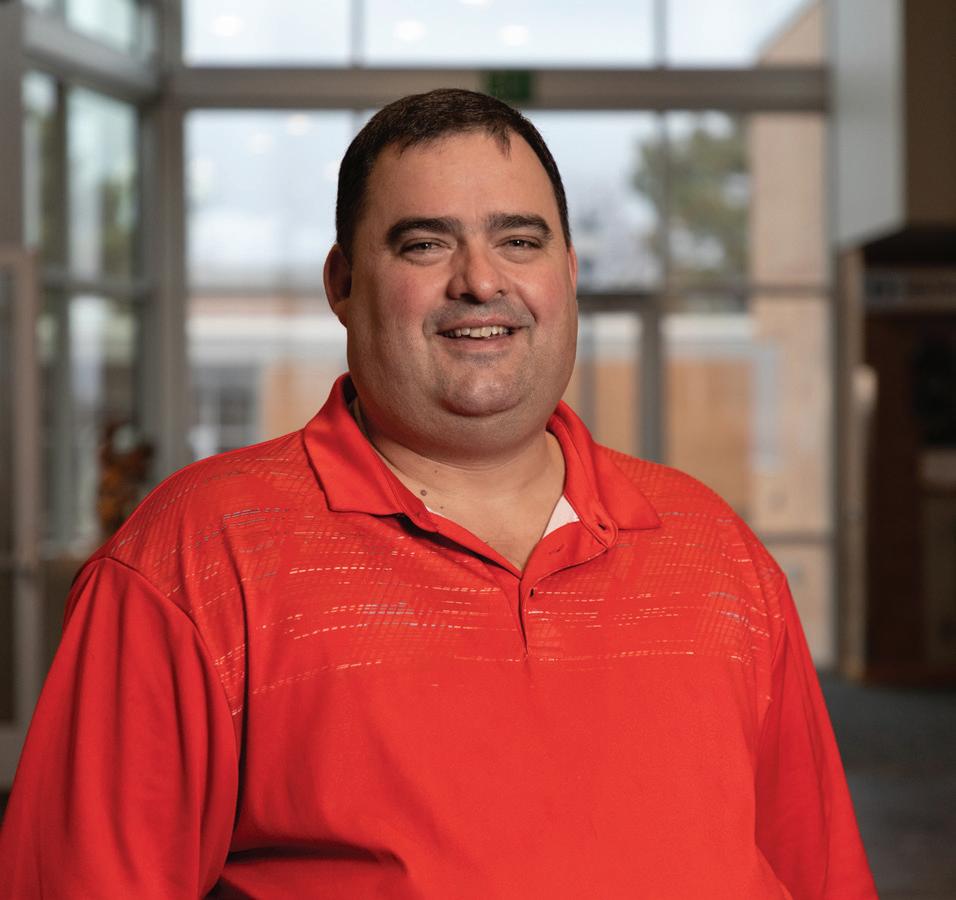
21 Academic Report 2019 | Dixie State University
Art Without Borders: La Frontera Project
by Emma D. Lee, Senior, English Major, Professional and Technical Writing Emphasis
In a current political atmosphere of high internal patriotism and a flurry of rhetoric regarding immigration, talk of building a wall, and outrage at the enforcement of new immigration policies, the reality of what is happening at the U.S.-Mexico border and the implications thereof can be hard to find. This is why Dr. Kathryn Mederos Syssoyeva and a group of DSU Dance and Theatre students traveled south. There, they searched for the truth about what life at the border is like to create a theatrical work that truly embodies the human impact of a “zero-tolerance” immigration policy.
In mid-October, this group of Dance and Theatre students conducted fieldwork, visited sites, and talked to social groups and immigrants regarding crossing the border and the injustices and challenges that they face on a daily basis. In five weeks, the College of the Arts had devised a complete multimedia show, entitled La Frontera Project, that included theatrical elements, dance, photography, film, and art along with quotations and monologues from those affected by the policies, including asylum seekers, migrants, border guards, lawyers, migrant rights activists, and first-generation American citizens.
The show, performed twice to a packed house, had an effect on many, including the students who participated in the project. Many of them reported that they learned facts about the situation, but more importantly, many revealed that they learned about humanity and about friendship and compassion. “I personally learned some new things about the situation, how people were being handled and the level of disregard they were being treated with…I learned in a weird way that there is more of a personal side to everything, but I think I saw the personal side of these stories, more on this research trip,” said student Kat Hunsaker.
La Frontera Project also had an impact on the community. Following the performance, the stage was opened for a community talk-back session, which on both nights lasted for over an hour and a half. “The audiences wouldn’t leave,” says Dr. Syssoyeva, “People were weeping; audiences were weeping; actors were weeping.”
People from the community and students from the university shared their experiences and their perspectives on the issue. One man had been led to the show when he heard one of the actors talking about it from another booth in a restaurant the night before. He talked passionately about his perspective on immigrant families from Mexico—a perspective he gained through a lifetime of working alongside them in the fields. “God sent this show to me,” he told the audience. Another woman shared that, although of Mexican descent, she had been passing as white as she was fearful of attitudes under the current administration. Her aunt and uncle had been taken by immigration officers while dropping her cousins off at school one day.
Syssoyeva and the students aimed to help educate the community about what these policies are doing to people’s lives. “The audiences were asking, ‘What can we do?’” says Syssoyeva. “Educate yourselves. Don’t rely on what other people tell you is going on. Don’t rely on the media. Go out and do direct research.”
22 dixie.edu | active learning. active life.
“ The audiences wouldn’t leave. People were weeping; audiences were weeping; actors were weeping.”
-Dr. Kathryn Mederos Syssoyeva
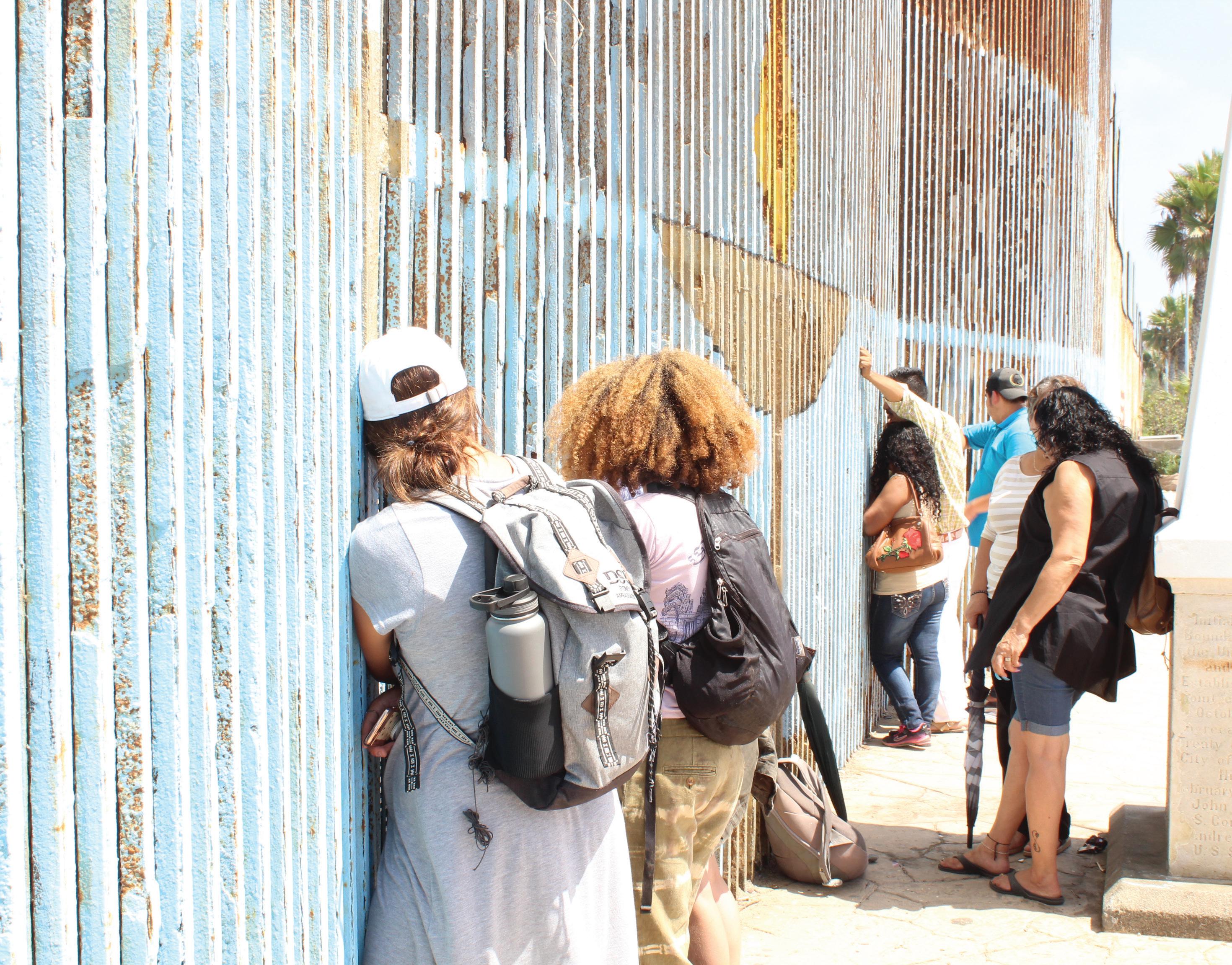
23 Academic Report 2019 | Dixie State University
Dance and Theatre students visit the U.S.-Mexico border while conducting fieldwork for their multimedia show, La Frontera Project.
ATWOOD INNOVATION PLAZA: The Gathering Place of Brilliance
by Sallie Sullivan, Senior, English Major, Secondary Education Emphasis
As Dixie State University’s Director of Innovation Guidance and Solutions, Dr. Wayne Provost has seen over 460 people with ideas for new inventions. Significantly, over 200 of these individuals were DSU students. Not only does Provost hold 18 patents himself, including one for resealable food and cereal cartons, but he also has guided numerous students, faculty, and community members through the patent process. When Provost began working at the university in October of 2016, his goal was to obtain 10 patents in 5 years—a goal he said would be “a miracle” if achieved.
After a mere two years, Provost helped complete 83 patent applications, 13 of which were granted. An active humanitarian and relentless intellectual, Provost came to Dixie to mentor promising young entrepreneurs and help grow the St. George business community. One reason Provost chose St. George was his belief that it was “a ripe place to start innovation.”
In January of 2017, Provost taught a class that instructed students in every aspect of obtaining a patent and turning it into a viable business. Throughout the semester, students helped set up a
corporation, built two prototypes, conducted trials and testing, and acquired marketing experience. Besides the valuable business experience they were obtaining, students were given the opportunity to purchase options in the company.
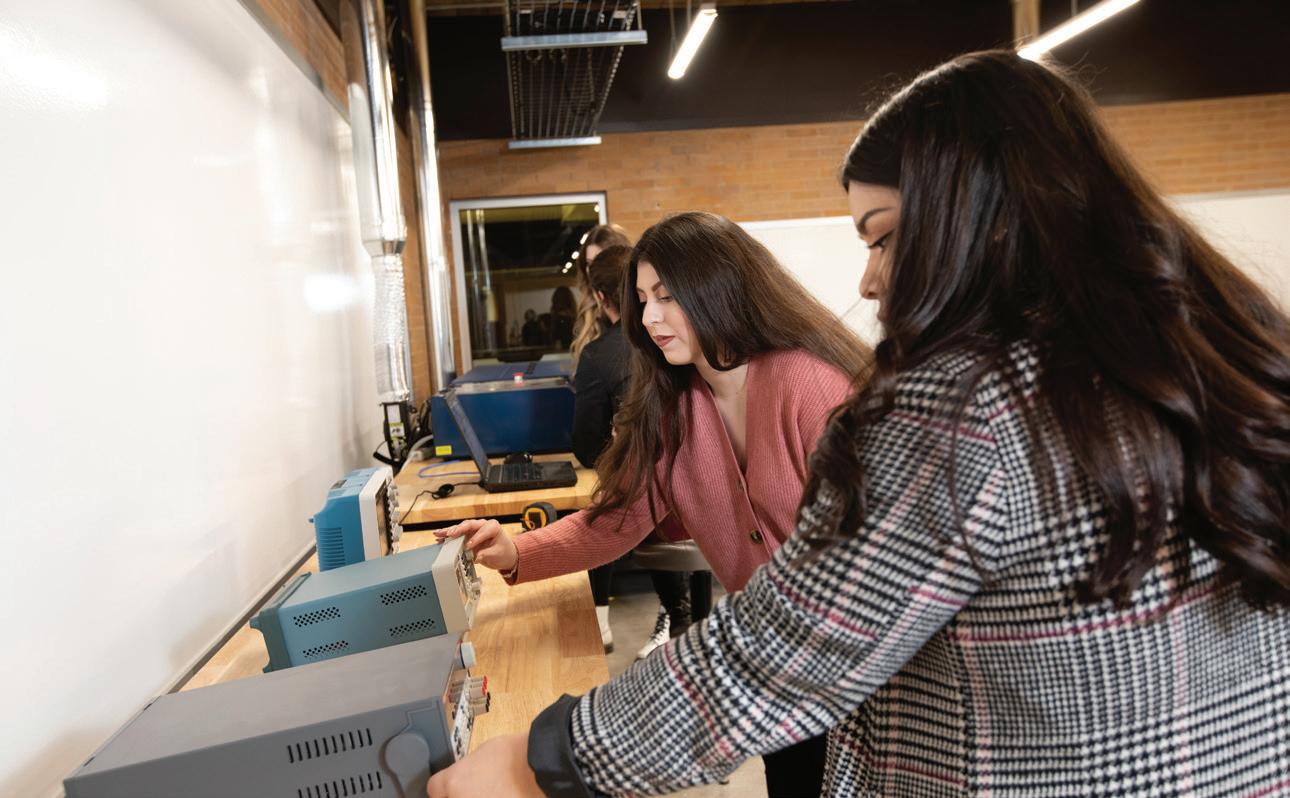
In addition to guiding individuals through the innovation process, Provost also helps with guidance solutions. This means that businesses can come to him and his students with problems they are experiencing. After examining the challenges and issues, Provost and his students offer solu-
tions, in addition to assisting them with obtaining patents, if necessary. A few large businesses in St. George have already reached out to Provost, resulting in successful resolutions. This is significant because, as Provost asserts: “When you start working on solutions, that is how you know you’ve made it.” He anticipates additional requests from other companies in the near future. Typically, Provost says, a university doctor obtains a grant and uses students and staff to work on a project. Once completed, the finished product is owned by the university.
24 dixie.edu | Features
Atwood Innovation Plaza makerspace houses equipment that budding entrepreneurs can use to build prototypes of their ideas.
Provost has taken his innovative work a step further by creating a mentor’s group, which provides private funds for student projects. With these funds, Dixie State students are assisted in turning their creative ideas into a personal business. In return, students gift the university a share in their business—usually 5 percent. According to Provost, Dixie State University is remarkable: no other university in the United States does what we do. Importantly, Provost aims to keep the businesses that were created under his guidance in St. George.
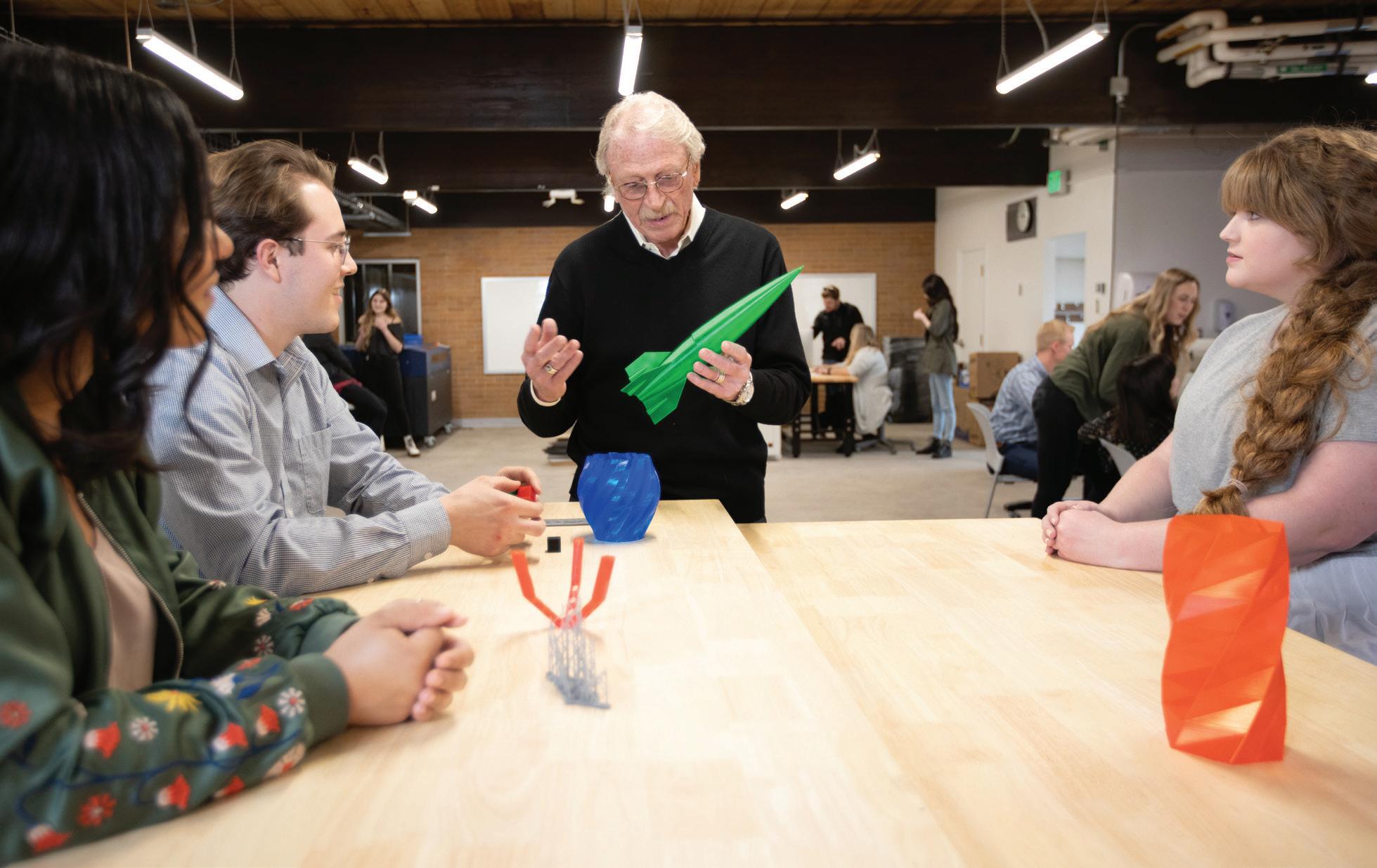
Attracting more than local attention, the innovation taking place at the university is drawing students to DSU. For example, Hunter Manz, a mechanical engineering major from Las Vegas Nevada is a student Provost began mentoring with Manz was in the seventh grade. Manz says that
Provost’s belief in him as a 16-year-old changed his life and helped him graduate at the top of his class. Manz was accepted by Harvard. However, he chose to attend Dixie because of the innovation opportunities available. Keeping students like Hunter in mind, Provost says that his ultimate goal for graduates is that “they’re not looking for a job, they’re creating jobs.”
In order to accommodate the innovation process, DSU is currently renovating Atwood Innovation Plaza. Scheduled for completion in August of 2019, the plaza is what Provost calls a “makerspace”—a facility where prototypes are built. The facility will be available to DSU students and faculty as well as members of the community. Provost says, “When the Innovation Plaza goes up, it’s going to be the gathering place of brilliance.”
25 Academic Report 2019 | Dixie State University
Dr. Wayne Provost, center, works with DSU students in the Atwood Innovation Plaza makerspace.
Bioinformatics: Program Prepares Students for Vital, Evolving Career Field
by Brittany Bennett, Senior, History and English Major, Literature Emphasis
A nexus connecting academic excellence, interdisciplinary coordination and mounting demands within the healthcare industry, the field of bioinformatics is booming, and Dixie State University’s Bachelor of Science in Bioinformatics is gaining enough momentum to help students keep up.
As its name suggests, bioinformatics unifies biology—particularly biological data and methods for its collection—with advanced computer programming. Bioinformatics scientists use their skillsets to synthesize immense data sequences, construct and operate data software, build individualized medical profiles, genetically modify crops, isolate sources of disease, and so much more.
Because bioinformatics packs such a powerful one-two punch of programming and life science knowledge that translates phenomenally into numerous professional contexts, bioinformatics scientists are in huge demand nationally as well as regionally in Southern Utah.
Despite the clear need for bioinformaticists who possess well rounded yet specialized training, not many degrees exist that cater to this field. Typically, bioinformaticists enter the profession with degrees in programming, biology, mathematics, or chemistry, predisposing them to major challenges and steep learning curves when adjusting to this work’s duties.
As DSU’s Department Chair of Biology Dr. Erin O’Brien puts it, “Very few bioinformatics programs like ours exist.”
“There are bioinformatics programs in the country that are predominantly computer science. We developed our program because we wanted to produce students who had a really, really strong foundation in the natural and physical sciences as well as the mathematical and computer science components,” she explains. In large part, DSU’s program developed out of student, faculty, and community recognition that local bioinformatics jobs go unfilled continually.
Many graduates of DSU’s Physical and Life Science Programs have entered the University of Utah’s Biomedical Informatics M.S. program, demonstrating a pattern of undergraduate trajectory into the field. According to O’Brien, “The University of Utah is super excited to try and get some of our students into their master’s program.” Programs like these have taken note of DSU graduates and the edge that their increasingly unique, bioinformatics-oriented education gives them.
Through access to annual internships with Stanford and a partnership with Intermountain Healthcare’s Precision Genomics, a program that tests cancer patients’ DNA to designate individualized treatments, bioinformatics students stand to gain plenty of hands-on, impactful experience.
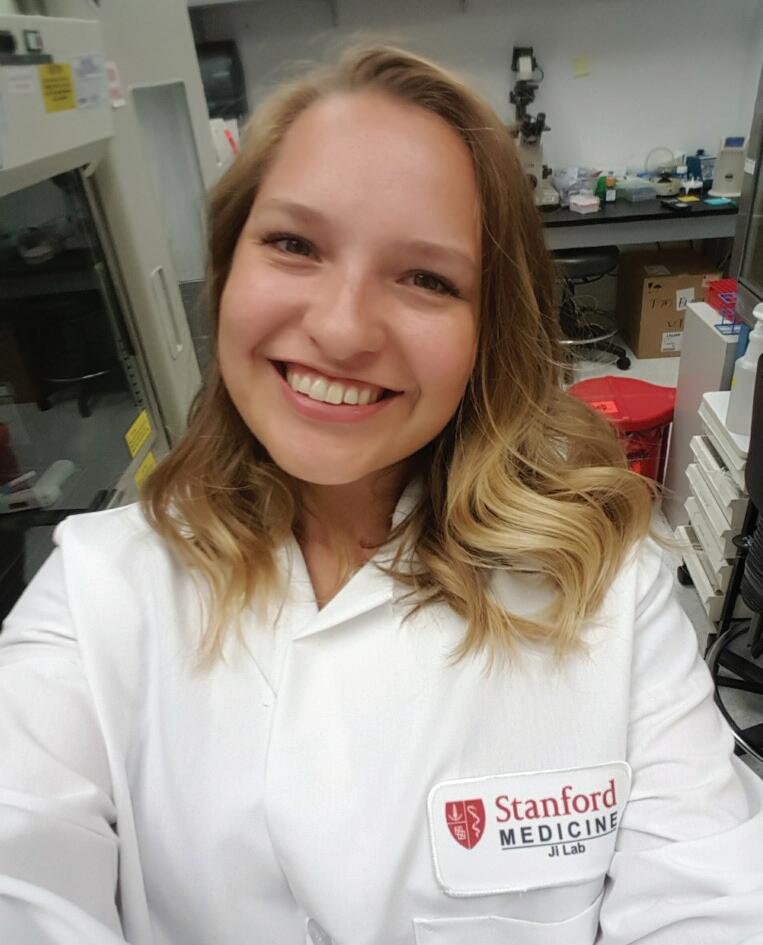
Last summer, student Austin Montgomery attended Stanford for a bioinformatics internship, the first of its kind. This internship was a third addition to the original two Stanford internships awarded to pre-medical students from DSU over the last six years. This resulted from Stanford’s interest in DSU’s students with bioinformatics exposure.
These internships serve as excellent opportunities for students to develop confidence and test their limits. “There are amazing, talented students here at Dixie State, but some of them don’t know how amazing they are. Putting them
26 dixie.edu | Features
DSU student Kennedy Roché participates in a summer internship program at Stanford University.
into a program where they’re working with worldclass researchers and participating in the same things as Stanford students helps them see what they can do. We want them to understand everything that they’re capable of and to have goals that reflect that,” says O’Brien.
Currently working as a full-time leading bioinformatics scientist for Precision Genomics, Dr. Sharanya Raghunath offers instruction to the small group of students taking advanced 4000-level bioinformatics courses at DSU. Of this exchange, O’Brien reports, “Likely the most qualified person in the state is offering those classes for us, and this is an incredible opportunity for our students. Long-term, we will be looking for a full-time faculty member that we can bring on board here. That’s probably our department’s greatest need right now.”
The arrival of a specialized, full-time bioinformatics instructor will mark a vital turning point for the new program. This will enable others to begin expanding the program. Investing in new equipment certainly comprises an important
early step since bioinformaticists require access to swift Internet speeds, state-of-the-art computers and servers that enable students to work with massive data sets. Expanding also means recruiting and informing people, particularly high school students, of the opportunities that this field entails.
For concurrent enrollment students interested in bioinformatics, a new certificate program in Biotechnology is available. This program covers all the first semester classes for the baccalaureate Bioinformatics program as well as the requirements for any of the biology or chemistry bachelor degrees. Students who do not settle on a major early in their academic careers but possess an interest in these fields can begin working on their certification to have a springboard into one of several different Biology majors.
By the end of 2019, two students will be the first to graduate from DSU’s Bioinformatics program. The conditions of their final year of undergraduate study certainly work for a pair taking advanced coursework, collaborating closely with a specialist on projects. As the program takes on an increasing number of bright, driven students in the next few years, it will require continued support to keep pace in this vital, evolving career field.
The emerging field of Bioinformatics is an essential component of the life science industry. Utah’s life science companies include careers in medical device manufacturing, advanced diagnostics, research, biotechnology and pharmaceuticals, and health care IT, among other innovative and groundbreaking fields. 26.2%
8.4%
science job growth in Utah was 8.4% from 2015 to 2016
3rd
Utah ranks #3 in the genomics market in the nation, based on innovation, talent, and growth.
34,352
Number of jobs generated by Utah's more than 1,000 life science companies.
13th
Utah has the 13th largest life science industry in the nation.
27 Academic Report 2019 | Dixie State University
Utah's
Average
life science industry increased 26.2% from 2012 to 2016. 140%
wages in life science are 140% of the Utah average wage.
Life
“Very few bioinformatics programs like ours exist.”
-Dr. Erin O’Brien
Source: BioUtah: Utah Life Sciences Industry Report 2018
Soft Cell Research: Public-Private Partnership at DSU Leads to Groundbreaking Discoveries
by Braxton Thornley, Senior, English Major, Secondary Education Emphasis
The contents of Room 201 in DSU’s Science Building appears rather ordinary on the surface: a folding table and chairs positioned inside the main entrance to collect blood samples, a “swear tally” (accompanied by a folded sheet of paper dictating the size of the fine, to be collected at the end of the semester, for an array of popular curses), and four student interns draped in lab coats staring down into cameras and microscopes. Yet, for all of the lab’s quirky character, it holds an excitement that is difficult to overstate. Although it’s tempting to blame the room’s aura on the 175-some-odd blood samples culturing L-form bacteria within the small lab, that would be only half of the story.
Brent Hunt’s mission began in 2014 following years of failed joint replacements, sabotaged by infections that doctors couldn’t quite pinpoint. As he began studying the
bacteria levels in his own body and testing his own blood, Hunt developed a groundbreaking technique for culturing specific types of bacteria that operate without cell walls. According to Hunt, studying these bacteria—known as L-form bacteria—could lead to treatments, and potentially cures, for a variety of ailments, from auto-immune disorders to chronic fatigue and migraines.
With a patent pending for his method of culturing and observing L-form bacteria, Hunt founded Soft Cell Research and quickly partnered with DSU to continue searching for the connections between disease and these previously unseen bacteria.
To date, the mutually beneficial public-private partnership has processed blood samples from over 2,000 donors and discovered over 300 new strains of bacteria. However, according to Hunt, the lab’s initial findings
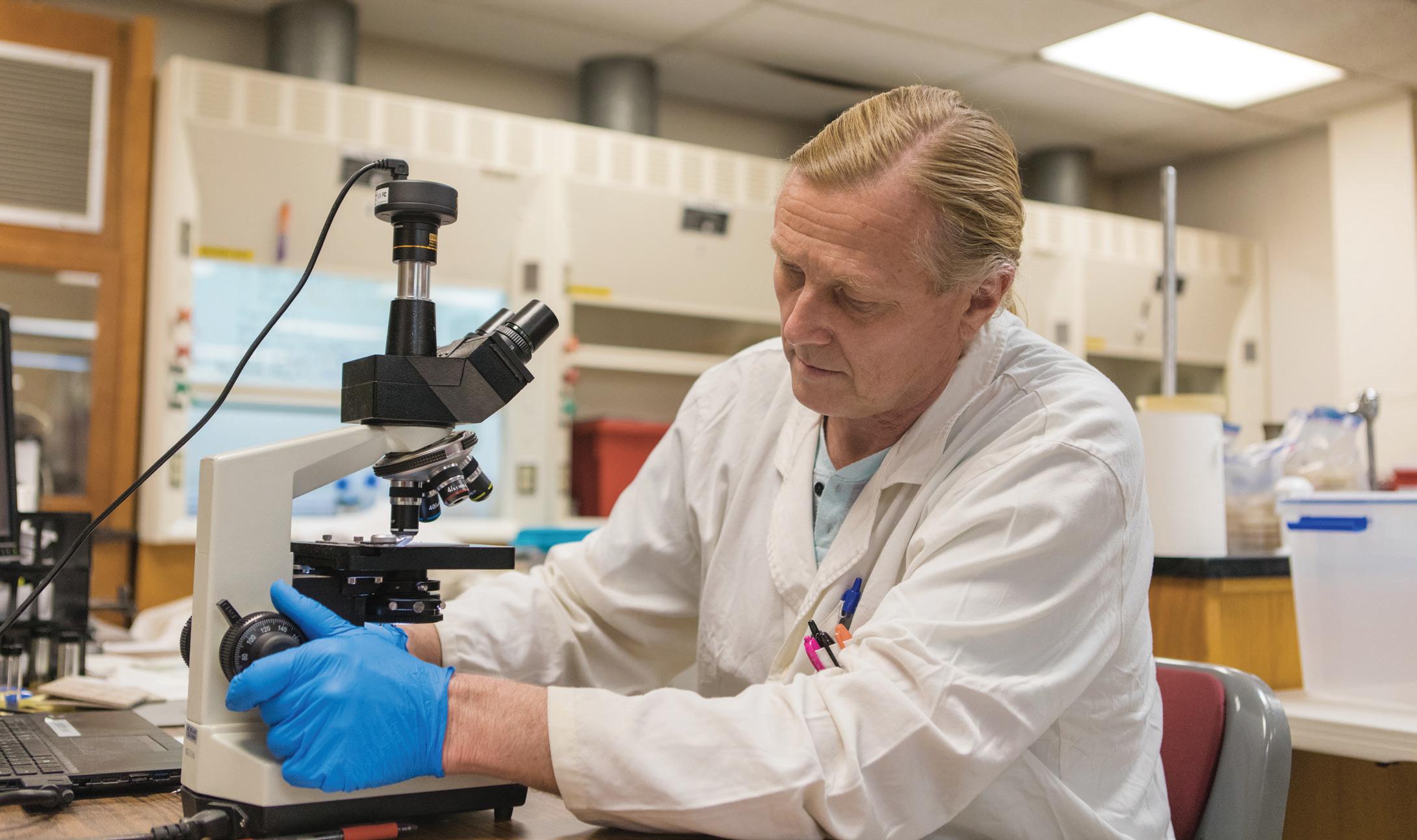
28 dixie.edu | Features
Brent Hunt researches L-form bacteria as part of Soft Cell Research's goal to create treatment for a variety of ailments.
did lead to push-back throughout the scientific community. Because the findings indicated that bacteria existed in human blood, which was previously thought to be sterile, medical scholars originally dismissed the discoveries as flawed. It wasn’t until last year, when Stanford University produced a study corroborating DSU and Soft Cell’s results, that the findings began to truly be taken seriously. Almost a year later, the partnership is benefiting from collaboration with Oxford University, the Quadram Institute, and other organizations.
Additionally, the U.S. Economic Development Agency recently awarded a $570,000 grant to DSU and Soft Cell to continue their research. The grant, Hunt says, will help the lab transition to a larger, more well-equipped lab in Atwood Innovation Plaza on DSU’s campus.
Beyond the partnership’s scientific accomplishments, Hunt is also quick to point out the benefits to the students who work as interns in the lab.
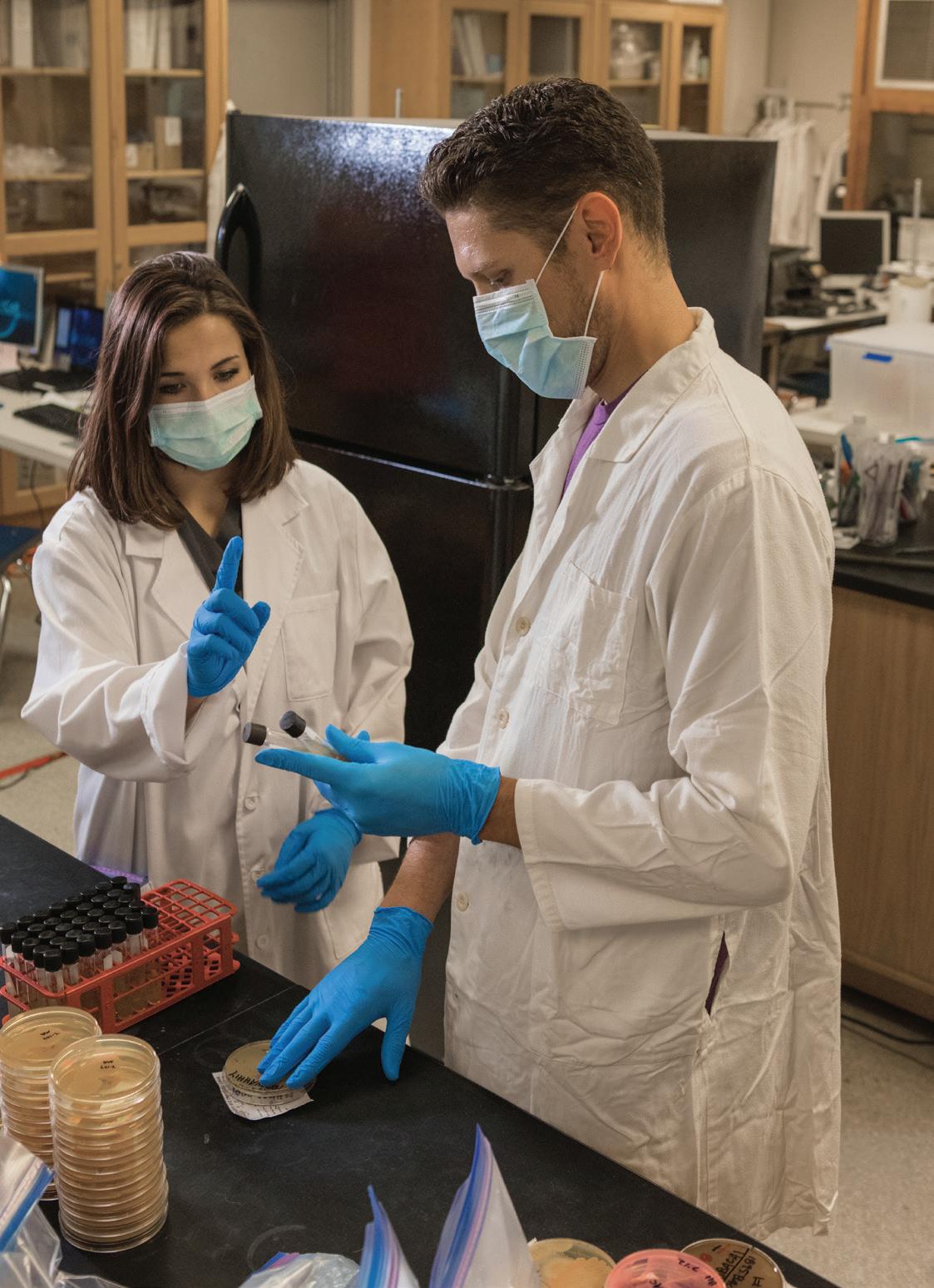
“This is the only place in the world where students can study L-form bacteria. You can’t do this at Harvard. You can’t do this at Johns Hopkins,” Hunt says, noting that, because the procedure for studying the bacteria is protected as intellectual property, DSU’s students have a unique leg up on graduate school applications. Medical schools across the country have taken notice, according to Hunt, who notes that many of the lab’s student interns go on to receive offers to pursue joint M.D.-Ph.D. programs at universities interested in their research experience.
Working in the lab is more than an impressive résumé-booster for students, though. The experience allows students to marry what they’re learning in the classroom with actual application, which helps “bring everything together,”
according to Hunt. Because students help perform all of the culturing and analysis, they’re able to see how the theory they’ve learned plays out in a physical lab. Additionally, although half of the lab focuses on bacteria culturing and analysis, half is dedicated to a state-of-the-art genetics lab. The combination of the two halves facilitates comparisons between donors’ bacteria-makeup and DNA while allowing students to work across various domains within biology and chemistry.
Back in the lab, one of the student interns finishes photographing a petri dish, hangs up his lab coat, and scoops up a pile of biology textbooks from one of the room’s crowded counters. As Hunt and I step out of the student’s way, Hunt notes that participating in the lab truly defines DSU’s active learning approach to education. He then goes on to explain the true goal of the research: "We don't want to treat people. We want to cure people."
29 Academic Report 2019 | Dixie State University
DSU students participate in scientific research.
“We don't want to treat people. We want to cure people.”
-Brent Hunt
Undergraduate Research at DSU: Students Foray into the Unknown
by Brittany Bennett, Senior, History and English Major, Literature Emphasis
For DSU students April VeVea and Jayson Foster, undergraduate research is an illuminating journey into untrod territory.
Most students long for the day when they can walk off campus for the last time, degrees at last in their grasp, and finally feel the weight of academic obligations lift off of their shoulders. Yet, not all students view a college education as the means to an end. In fact, some find it meaningful enough to adapt their undergraduate experiences into lasting projects and commitments long after they shift their cap tassels to the left.
Seniors slated to graduate this spring, VeVea and Foster are hardly ready to close their books on research in each of their respective fields—history for the former, chemistry for the latter.
A published film historian and prospective graduate student, VeVea is concerned with the meaning of words— specifically, the historical meaning of the phrase “Jim Crow.” She explains, “There has been a historical debate

for roughly 100 years trying to figure out how an early 18th century minstrel character became the name for segregation laws from the late 19th through mid 20th centuries.”
Her source analysis thus far leads her to simultaneously depart from and contribute to this topic’s scholarship. She explains, “‘Jim Crow’ wasn’t a term to be used exclusively for African Americans during the 1800s. It was used to describe people who were political flip-floppers or were considered self-serving, and it was used as another name for the poor (albeit loosely).”
Her study of this topic also serves as a lesson in perspective and objectivity: “People have been wanting to look at the term as strictly racist because of what it came to represent with segregation laws, and—while that’s important—we need to backtrack a little bit and focus on all of its meanings and how it was commonly used to fully understand exactly how it crossed over.”
Essential to navigating this complex topic, actively questioning and reading between the lines are forms of
30 dixie.edu | active learning. active life.
DSU senior April VeVea is researching the historical meaning of the phrase "Jim Crow."
intellectual gymnastics April gets twisted up in regularly— not to mention the hours spent scouring screens filled with tiny, faded print.
Foster, on the other hand, enjoys spending his time playing with magnetic liquids. Over the last year and a half, he has explored the paramagnetic crossover of minute to bulk concentrations of cobalt ionic liquids. His research focus developed out of an unanticipated materials reaction while he performed lab work independently.
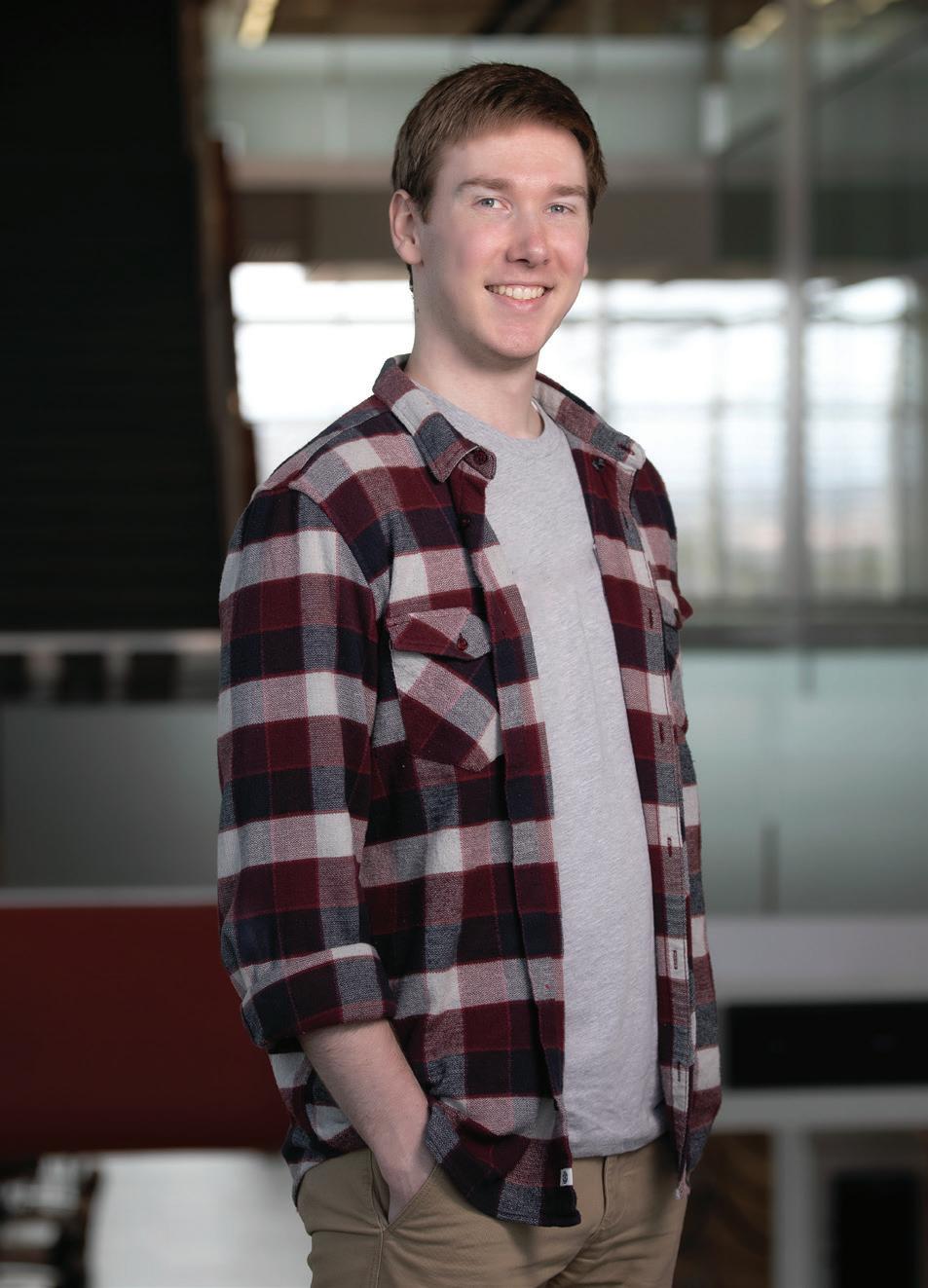
He recounts, “When the sequence of dissolving cobalt chloride with sodium dicyanamide in water led to an unexpected precipitate, I had full freedom to investigate what that precipitate was with my own strategy of how to elucidate its identity.” Instead of finding himself deterred by strange, new outcomes, he is motivated by them.
His earnest interest in divining the phenomenon he observed in that original ionic liquid shift of mass inspired him to seek out collaboration and specialists’ guidance at DSU and beyond. His work alongside other chemistry scholars has culminated at the end of 2018 in a co- authored article published in the American Chemical Society Energy Letters Journal. He declares, “I’m absolutely in love with doing research. I want to get a career in research and development and am going to graduate school for a Ph.D. in materials chemistry next year because I’ve had such a good experience.”
VeVea and Foster know how to locate and make the most out of their scholarly resources and opportunities. VeVea asserts the value and validity of newspapers as primary sources for her research, highlighting the incredible possibilities afforded by the abundance of online—and
sometimes, free—newspaper databases. She explains, “I’ve been able to see how people used ‘Jim Crow’ from Los Angeles, California, to Buffalo, New York. What would normally take me several years to find, if I found anything at all, can now be found within seconds via newspaper databases.”
For Foster, supportive connections with fellow chemists inform his research process in a truly collaborative fashion. Over the last two summers, he has participated in Research Experiences for Undergraduates programs at Boise State University and the University of Wisconsin where he worked with and learned from graduate students. With the guidance of instructors and peers, the right tools and a little elbow grease, motivated students at DSU foray into the unknown to emerge as more assured individuals with plenty of new insights to share with us all.
31 Academic Report 2019 | Dixie State University
“I’m absolutely in love with doing research. I want to get a career in research and development and am going to graduate school for a Ph.D. in materials chemistry next year because I’ve had such a good experience.”
- Jayson Foster
DSU senior Jayson Foster is researching cobalt ionic liquids.
STUDENT SPOTLIGHTS
Emily Flores: Blazing Paths for Future Generations
by Julie Handy, Junior, English Major, Professional and Technical Writing Emphasis
Emily Flores was encouraged by a high school guidance counselor to make the move from her home in Los Angeles, California to St. George, Utah. Now in her junior year at Dixie State University, Flores has found a love for the beauty of the red rocks and flaming sunsets. She is earning a Bachelor's Degree in Communication and a Minor in Social Justice with plans to continue her education with a Master's Degree in Higher Education Administration.
Flores is a first-generation college student, and when asked what challenges she has faced at school, she said, “Just realizing that I should attend college and I should be on campus was and is definitely something that I have struggled with.” By joining the
Dixie Hispanic Student Association (DHSA) in her freshman year and being on the Multicultural Inclusion Center (MIC) Student Council, Flores has become involved with student life and is flourishing at Dixie State.
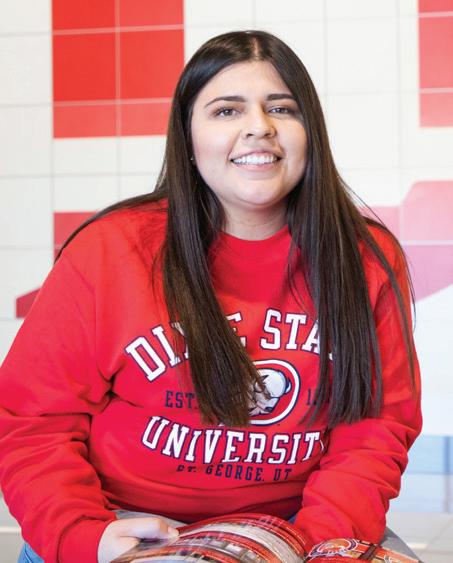
Dixie Rock is Flores’ favorite place in St. George. She loves to watch the sun set and take in the view. Between classes, the DHSA, and the MIC, Flores also plays guitar and, in the summer, works as a camp counselor at a music camp. She hopes that as DSU grows, students will be encouraged to join clubs and realize that there is something to suit everyone’s interests, and if students have not figured out what those interests are, then there are ways to help them find out.
Jordyn Chambers: Using Programming Skills to Tackle Life
by Taylor Lewis, Senior, Media Studies major, Multimedia Journalism Emphasis
Dixie State alumna Jordyn Chambers tackles life as if she were in a video game. Rather than view life as a series of problems that may hold her back, she looks at it as another level she needs to pass, no matter how daunting the challenge may be.
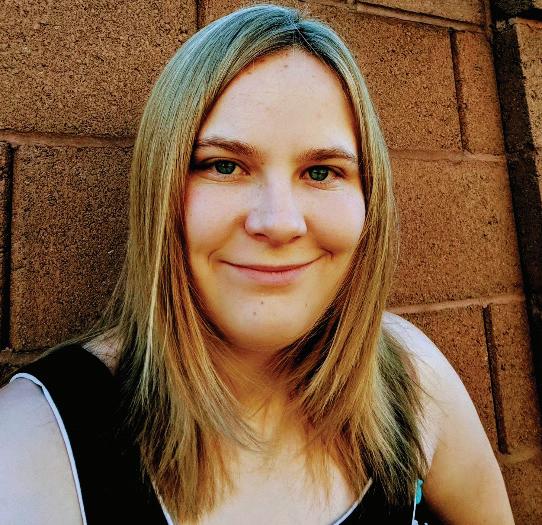
As her passion for video game design blossomed into an interest for computer programming, Dixie State University gave her the opportunity to gain real-world experience in her career field while helping pay her way through school. Although financial hardships posed an initial setback while attending Dixie State, with inspiring professors to guide her, Chambers pushed herself to graduate with a Bachelor of Science in Computer
and Information Technology with a Minor in Computer Science in May 2018.
Hired as an AI2 Associate at Amazon Web Services right after graduating, Chambers continues to apply her knowledge and experience from DSU to create and manage software services for one of the largest enterprise cloud providers in the world.
“If I hadn’t finished my degree or gained the necessary experience at Dixie State University, I wouldn’t be where I am today,” Chambers said. “The CIT department faculty and staff helped me succeed and ultimately changed my life for the better.”
32 dixie.edu | Student Spotlights
Derek Brazeau: From Red Rocks to Broadway
by Sallie Sullivan, Senior, English Major, Secondary Education Emphasis
When Derek Brazeau began attending Dixie State University, he loved music, but lacked direction. Fortunately, he met Director of Raging Red Merrilee Webb, who encouraged him to audition for DSU’s performing song and dance team, Raging Red. “I didn’t have a full vision yet,” Brazeau explains, “and the professors at Dixie gave me options.” After making the team, Brazeau performed with the group for several years, even traveling to New York and China.
Although he majored in music and voice, Brazeau was involved in several artistic pursuits, which included dancing with Dixie State University’s Dance Company. Professor Sara Gallo says that this experience, combined with his classes at DSU, “contributed to great growth in his dance technique
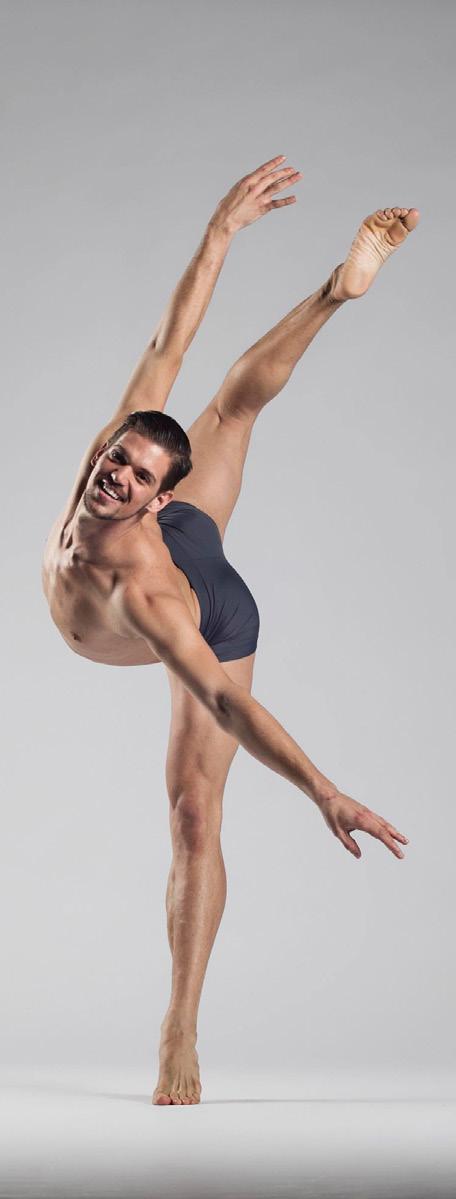
and artistry.” His performing experience, hard work, and connections with classmates continued to open doors for Brazeau.
While at DSU, Brazeau performed in Thoroughly Modern Millie, Starlight Express , and Mary Poppins at Tuacahn Center for the Arts. He was also chosen to perform a voice solo at graduation. When reflecting on his education, Brazeau says what he most appreciated about Dixie State was how inviting it was. “The classroom setting was very intimate and the professors were supportive and insightful.” Shortly after graduation, he was hired as a professional dancer for Odyssey Dance Theater.
Brazeau continues to push himself outside his comfort zone because “the end reward is amazing.” His years spent perfecting his artistic talents have more than paid off. Brazeau currently works in New York and is performing in his third tour with the Broadway production Kinky Boots.
33 Academic Report 2019 | Dixie State University
57% female 43% male percentage of minority students 24% 51% percentage of students age 19 or younger percentage of students with Utah residency 82%
BODY
STUDENT
DEMOGRAPHICS
Student Perspectives
BROOKE RAWLINSON, Senior, Criminal Justice Major, Criminology
Emphasis: In November of 2017, I was granted the opportunity to attend and present research at the annual American Society of Criminology Conference in Philadelphia, Pennsylvania. As a team of four undergrad researchers, we studied and presented on what strategies work in order to provide elementary aged students with effective supplementary education programs. Being a part of this research group provided me with the hands-on learning that Dixie State University is passionate about, as well as gave me an inside look at what it means to be an academic professional.
HOLLY PAYNE, Senior, Individualized Studies Major and Respiratory Therapy Graduate: As a student of Respiratory Therapy, I had the opportunity to submit an abstract to the American Association for Respiratory Care (AARC) for consideration to present in their 2018 National Convention open forum. In July, my abstract was accepted, and in December, I presented at the AARC National Convention in Las Vegas. I also served as the President of the Respiratory Therapy Club and I was able to organize and participate in many great healthcare-related service projects, including Pennies by the Inch for Primary Children’s Medical Center.
JENN MARSH, Senior, English Major, Creative Writing Emphasis: DSU has challenged me by providing experiences I couldn’t have had anywhere else. Through the Craig and Maureen Booth Honors Program, I have studied abroad in Costa Rica and presented at multiple research conferences in California. I have presented at UCUR and the DSU Research Symposium twice and hope to again in 2019. Without the support of the university, I wouldn’t have been able to pursue any of it. In addition to travel funding for everything listed above, I have received the Judith and Gene Schneiter Scholarship and an internship in the CHaSS Dean’s office.
MARIAH RICHINS, Senior, Biology
Major: I am part of a team that performs biochemical research studying the effect of hyperglycemia on red blood cells. I presented this research at regional and worldwide conferences. My communication and presentation skills have improved with each conference, and I am now confident in explaining the research process and answering questions pertaining to my project. I am also part of a team that studied canyon tree frogs in several canyons in Zion National Park this past summer. This field research is valuable as I learned that there are many aspects of science that cannot be controlled.
KORI GAHN, Junior, Elementary Education Major: Working as a tutor in the Students Helping English Language Learners program has been beneficial for more reasons than one. It has given me opportunities to experience first-hand how students who are English Language Learners learn best. I am in the Elementary Education program, and we will be English as a Second Language endorsed teachers when we graduate. We learn how to help students succeed in the classroom, and being able to use what I have learned has been a rewarding and beneficial experience. Giving these students a chance to participate in and experience American culture has been the most fun, though.
ZACHARY WEBB, Senior, Music
Major, Percussion: Due to the wonderful Music Department at Dixie State and my mentor, Dr. Glenn Webb, I have pushed the limits of what a percussion or music student can do. I presented two solo recitals in a calendar year and presented research at the Utah Conference on Undergraduate Research twice. On top of that, I was able to perform with the Southwest Symphony, Dixie State Symphony Band, as well as with the Dixie State Symphony Orchestra as a timpani soloist. In Fall 2018, I performed the world premiere of Cyril Plante’s Concerto for Timpani and Orchestra.
34 dixie.edu | Student Spotlights
MCKENNA MATHIE, Junior, Criminal Justice Major: I started to study Criminal Justice and was eager for a more hands-on type of learning. I found an internship listed online and applied right away. I eventually was awarded the internship and loved it. I gained knowledge and skills through this experience that I will use throughout my career. This internship also helped boost my résumé for when I applied for an internship with the Senate in Washington, D.C. The experience from these opportunities will be incredibly helpful when I apply to law schools and pursue a career practicing criminal law and eventually running for office.
JENNIFER SPONG, Senior, Integrated Studies, Humanities and Art History: At DSU, I joined the Honors Program, presented my research at Utah Conference on Undergraduate Research, studied abroad in Rome for three weeks, published my art and poetry in Scribendi and Route 7 magazines, displayed my art in a juried show, and was a teaching assistant for an art history class my junior and senior years. The most unique and important thing I got to do here, though, is interact with my professors on a one-on-one basis because of the small class sizes. Their feedback and knowledge has influenced my academic development more than anything else I achieved at DSU.
OLIVIA LEE, Senior, Media Studies, Strategic Communication Emphasis: I needed an internship to graduate and wasn’t having any luck just Googling things in the area. I decided to check out the career center's website to see if that could get me any closer, and I immediately found an internship I was really excited to apply for. Handshake matched my credentials with a position as an ambassador for Venture Creative, a local digital marketing company. I applied, interviewed, and started the internship in January. Not only do I get to graduate, but I get some really great experience for my future career.
Students Helping Students: SHELL Tutors Reach out to International Students
by Krista Kirkham, Senior, English Major, Creative Writing Emphasis
Dr. Chizu Matsubara, Professor of Education, says that students in the Department of Education have been tutoring international students for the last 10 years with the Students Helping English Language Learners Program, the SHELL program for short. SHELL is a student-led program coordinated with the ESL department and the International Student Office.
Natsuki Ito, an international student, had a very positive experience with the program. She says that the tutors guided students “with great passion.” According to Natsuki, a central focus for tutors was on pronunciation. She
says, “I wasn’t good at the pronunciation of 'r' at first, but I was able to improve that thanks to [the tutors].” The tutors also evaluate presentations and assist with writing, especially grammar. Finally, Natsuki appreciated that tutors helped international students “not only in terms of studying but also in terms of recreation.” She explains, “They held a Halloween party for us. We experienced and enjoyed pumpkin carving there. They also gave us Christmas presents. We were able to have a very fulfilling life while studying abroad thanks to them. We are really grateful for [the efforts of the SHELL tutors].”
35 Academic Report 2019 | Dixie State University
DIXIE STATE UNIVERSITY GRANTS
DEPARTMENT PRINCIPAL INVESTIGATOR SPONSOR
PROJECT TITLE
36 dixie.edu | active learning. active life.
AWARD Community & Global Engage. Dr. Nancy Hauck Carl D. Perkins Grant ATE-Perkins Special Project Grant $245,533 Community & Global Engage. Dr. Nancy Hauck Carl D. Perkins Grant ATE-Perkins Special Project Grant FY17 $37,862 Small Business Dev. Center Len Erickson Governor’s Office Eco. of Dev. Business Expansion, Acceleration, Retention $17,000 Community & Global Engage. Becky Smith, Dr. Nancy Hauck State of Utah CPP-Kmatch Sunset & Hurricane FY17 $65,000 Dental Hygiene Patricia Wintch State of Utah HEA-FY17 Dent Hyg Prime Care Prog 2 $84,564 Dental Hygiene Patricia Wintch State of Utah HEA-FY17 Dent Hyg Prime Care Prog 1 $15,288 Small Business Dev. Center Len Erickson Governor’s Office Eco. of Dev. PTAC $5,000 Small Business Dev. Center Len Erickson Governor’s Office Eco. of Dev. Business Resource Center $20,000 Physical Science Dr. Sam Tobler University of Utah Teacher Workshops $4,508 Elementary Education Jeri Crosby Beverly Taylor Sorenson ED-BTSALP Professional Dev. Grant $50,000 Elementary Education Jeri Crosby Beverly Taylor Sorenson FED-BTSALP FY17 $12,000 Physical Science Dr. Erin O’Brien National Parks Service NAT-Mojave Outdoor Leadership Academy $98,895 Mathematics Jessica Davis USHE/Utah Legislature Advancing Concurrent Enrollment $258,528 Small Business Dev. Center Len Erickson Small Business Admin. Small Business Dev. Center $195,000 Mathematics Sylvia Bradshaw, Jessica Davis Utah STEM Action Center Dixie PREP $1500 Mathematics Dr. Jie Liu Math. Assoc. of America Math Magic $2710 Physical Science Dr. Sam Tobler University of Utah Solar Eclipse Trip $7,575 USHE Daneka Souberbielle Utah Systems of Higher Ed. ¡ Adelante! Washington County $75,000 Business Dr. Kyle Wells Utah State Board of Education General Financial Literacy $48,000 Computer Science Dr. Eric Pedersen, Vic Hockett Utah State Legislature-SWI DSU Tech Stacks $90,000 Upward Bound Craig Harter US Dept. of Education Upward Bound $1,804,305 Veterans Support Steven Roberts, JD Thompson UT Dept. of Vet. & Military Aff. MRG-Veterans Admin. Reimb.- Tutoring $2,500 Career & Technical Education Dr. Nancy Hauck Perkins ATE-Perkins Formula FY18 $193,693 Business Dr. Kyle Wells Governor’s Office Eco. of Dev. PTAC $5,000 Business Dr. Kyle Wells Governor’s Office Eco. of Dev. Business Expansion, Acceleration, Retention $17,000 Community Engagement Karyn Wright Userve DSU 9-11 Day of Service $1,000 Veterans Center Steve Roberts UT Dept. of Vet. & Military Aff. Veterans Center Furnishings & Equipment $34,975 Elementary Education Jeri Crosby Beverly Taylor Sorenson FED-BTSALP Professional Dev. Grant $50,000 Biology Dr. Erin O’Brien National Parks Service Colorado Plateau Coop. Ecosystems Studies Partnership Small Business Dev. Center Dr. Kyle Wells Governor’s Office Eco. of Dev. Business Resource Center $33,000 Computer Info. & Tech. Dolores Heaton, Curtis Larsen Utah STEM Action Center Souther Utah Chapter FIRST Lego League $5,000 Math Jessica Davis Utah STEM Action Center Dixie PREP $4,560 Biology Dr. Erin O’Brien National Parks Service Outdoor Leadership Academy $64,762 Career & Technical Education Dr. Nancy Hauck Perkins Perkins Special Projects- Med. Lab Supplies $83,283 Chemistry Dr. Rico Del Sesto USTAR - UTAG NAU $250,214 Sears Art Gallery Kathy Cieslewicz Utah Arts & Museums Sears Gallery Operating Support $8,000 Physical Science Dr. Andrew Christensen NASA GUVI Extended Mission Investigation $146,000 Business Len Erickson, Don Willie Small Business Administration Small Business Development Center $186,397 Math Dr. Jie Liu Math. Assoc. of America Math Circle $4,849
DEPARTMENT PRINCIPAL INVESTIGATOR SPONSOR
PROJECT TITLE
37 Academic Report 2019 | Dixie State University
AWARD Community Engagement Dr. Kelly Bringhurst Mexican Consulate IME Becas Adult Education $3,000 Community Engagement Dr. Kelly Bringhurst Mexican Consulate IME Becas Adult Education $2,000 Elementary Education Dr. Kari Gali GOED - Talent Ready Utah Autism/Neurodiverse Awareness $25,000 Sears Art Gallery Kathy Cieslewicz St. George City RAP Tax Sears Gallery Operating Support $8,000 Celebrity Concert Series Ginger Nelson St. George City RAP Tax Celebrity Concert Series Op. Support $15,000 Business Dr. Kyle Wells Economic Dev. Administration TIE Center at Innovation Plaza $1,750,096 Career & Technical Education Dr. Nancy Hauck Perkins ATE-Perkins Formula FY18 $322,273 TIE/Small Business Dev. Center Len Erickson Governor’s Office Eco. of Dev. DSU Business Resource Center $20,000 Elementary Education Jeri Crosby Beverly Taylor Sorenson FED-BTSALP Professional Dev. Grant $50,000 Physical Sciences Dr. Andrew Christensen NASA GUVI Extended Mission Investigation $147,000 Physical Sciences Dr. Andrew Christensen Aerospace Corp Atmospheric Ionospheric Lim Imager $75,000 TIE/Small Business Dev. Centers Len Erickson Economic Dev. Agency DSU & SUU University Center $715,000 TIE/Small Business Dev. Centers Len Erickson University of Utah Dev. Skills & Rural Business/ Gig Economy $10,000 Math Jessica Davis Utah STEM Action Center Dixie PREP $2,677 Biology Dr. Erin O’Brien National Science Foundation Noyce & STEM Mini Conference $8,850 Music Dr. Nancy Allred/Dr. Ka-wai Yu St. George Arts Commission Castle Rock Music Camp $11,960 Music Lisa Clements St. George Arts Commission Hope of the World $3,100 Music Dr. Glenn Webb St. George Arts Commission Rebel Jazz Band $4,000 Music Dr. Ka-wai Yu The Music Store DSU Cello Festival $150 Music Dr. Ka-wai Yu Celebrity Concert Series DSU Cello Festival $400 Music Dr. Ka-wai Yu Utah American String Teachers DSU Cello Festival $400 Music Dr. Ka-wai Yu Hong Kong Trade Economic Office DSU Cello Festival $500 Music Dr. Ka-wai Yu The Granary Café DSU Cello Festival $250 Music Dr. Ka-wai Yu Desert Strings Castle Rock Music Camp $1,000 Music Drs. Ka-wai Yu/Nancy Allred/Paul Abegg David and Betsy Vaught Castle Rock Music Camp $1,000 English Dr. Stephen Armstrong/Dr. Cindy King Humanities & Social Science DSU Literary Press $2,500 English Dr. Cindy King Humanities & Social Science The Southern Quill $750 English Dr. Cindy King Humanities & Social Science Community Engaged Learning $500 Spanish Dr. Lucia Taylor Office of Global Education Exploratory $1,000 Mathematics Dr. Vinodh Kumar Chellamuthu Academic Innovation Center Using Active Learning Strategies $1,870 Mathematics Dr. Vinodh Kumar Chellamuthu Mathematical Assoc. of America PICMath $5,000 Mathematics Drs. Buna Sambandham/Vinodh Chellamuthu Academic Innovation Center Project C^3 $1,550 Physical Sciences Dr. Zhenyu Jin Office of Global Education Remote Sensing of Landscape: China $1,000 Chemistry Dr. Wendy Schatzberg Academic Innovation Center Using Survey Prompts $1,700 Biology Dr. Geoffrey Smith Experiment.com (crowd funded) Impacts of Oil and Natural Gas $5,070 Biology Dr. Geoffrey Smith James A. and Patricia A. MacMahon Ecology Graduate Student $1,000 Biology Dr. Geoffrey Smith USU Ecology Center Ecology Center Research $10,500 Digital and Extended Learning Ryan Hobbs Lindsay and Laura Atwood Improving Retention through OER $19,000 TRIO Kitty Hughes U.S. Department of Education TRIO $1,980,000 DSU STEM Education Center Dr. Pam Cantrell USOE Math Science Partnership STEM Integrated Project $350,000 DSU STEM Education Center Dr. Pam Cantrell USOE Math Science Partnership 3 Dimensions of Science $250,000
FACULTY RECOGNITION, PUBLICATIONS AND RESEARCH
COLLEGE OF THE ARTS
ALEX CHAMBERLAIN, Assistant Professor of Art, exhibited “Photography: Sight Site,” DSU Sears Art Museum Gallery from June–August 2017. He won a DSU Distinguished Faculty Teaching Award in 2018. He is Chair of Toquerville’s Planning Commission and a City Council Member. He coaches a Lego Robotics Team.
SHANE CHRISTENSEN, Associate Professor of Art, exhibited in “Art Department Showcase,” DSU Sears Gallery and DSU Art Department April - May 2017. He is a member of NCECA and the American Ceramics Society.
LISA CLEMENTS, Adjunct Professor of Art and a member of the St. George Dance Company Board, co-produced and co-directed “Hope of the World, A Dance Nativity Concert” at the DSU Eccles Main Stage in 2018.
DR. LAUREN DISALVO, Assistant Professor of Art History, authored “Situating Classical Archaeology in the Midwest: The Early History of the University of Missouri’s Plaster Cast Collection” in Annual of the Museum of Art and Archaeology in 2015.
MCGARREN FLACK , Associate Professor of Art, has had art widely publicized in publications such as St. George News, INDA 12 International Drawing Annual, Dixie Sun Newspaper, Artist Magazine, 15 Bytes, The Spectrum Newspaper, and Southwest Art Magazine. He won a 1st Place Expressionism Figure Award, a 1st Place Political Commentary Award, and a 3rd Place Expressionism Figure Award, all
from the American Art Awards International Competition. He also won 1st Place in the Oil Painters of America Online Showcase. He has been a Utah State Art Fellowship Award recipient and a UT 2018 Teacher Scholarship Recipient for the Figurative Art Conference and Expo in Miami.
SARA GALLO, Associate Professor of Dance and St. George Dance Company Board Member, performs continually, for instance, “Straddling the Line” with Denise Purvis at the Movement and Dance Festival, Callahan Theatre at Nazareth College in 2018; “Moving Forward, Looking Back” at the Red Rock Dance Festival in 2017; and “Paint Your Favorite People with Light” at the Vine Summer Series with St. George Dance and Mojalet Dance Collective in 2014.
DENNIS MARTINEZ , Professor of Art, exhibited Arrangements: A Survey of Utah Collage at the Utah Arts Council Traveling Exhibition Program in 2017. He exhibited Frames of Reference, a One-Man Show at Left of Center Art Gallery in Las Vegas in 2017. He was a Spotlight Artist at a Printmaking Exhibition with USU’s Art Department in 2015. He exhibited Anonymous Faces: The Homeless, Addicted and Mentally Ill at DSU Eccles Fine Arts Center in 2014. He participated in a Regional Juried Print Exhibition at U of U in 2013.
DR. ROBERT MATHESON, Assistant Professor of Music, performed as a bassist for both “Prince of Egypt” and “Cinderella” at the Tuacahn Center for the Arts in 2018, as well as at other events. He performed many solo recitals, for example, “Music for Double Bass with Interactive Computer” for BassEurope 2018 International Double
Bass Congress; “Music for Double Bass with Interactive Computer” at DiFiore Center for the Arts; and “Brahms. Britten. Bach,” Saint George Chamber Singers at Kayenta Performing Arts Center in 2018. He was the chamber musician for “Utah ASTA Midwinter Workshop Chamber Concert,” American String Teachers Association at the Eccles Fine Arts Center. He is Co-Artistic Director for Grand Circle New Music and Assistant Principal Double Bass for the Southwest Symphony Orchestra.
DEL PARSON, Professor of Art, has had his art published in a book entitled I Am. He has completed numerous paintings in the past five years such as Come and See, Abide with Me, Heavenly Mother, Angel Mother, An Angel Strengthened Him, As I Have Loved You, Cedar City Temple, Beloved, Forgiven, Go in Peace, King of Kings, My Redeemer, Jairus’ Daughter, I Will not Leave Thee Comfortless, Light of Christ, Thy Will, Redeemer, Light of the World, and Sin No More.
DR. RHONDA RHODES, Assistant Professor of Music and President of the Utah Music Educators Association, authored many publications for Utah Music Educators Journal from 2013–2018: “William Grant (1838–1916) American Fork Pioneer: Passion for Music in Every Situation...and I do mean EVERY” ; “Inclusion, Diversity, Equity and Access in Utah Music Classrooms” ; “Best IN the World or Best FOR the World?”; “I Will Always Need My Teachers”; and “ESSA Title IV Part A Funding; Can it Make a Difference in Your District?” She wrote a dissertation entitled “Music Education in the Utah Territory (1850–1896)” for Boston University in 2017.
38 dixie.edu | active learning. active life.
DR. BRYANT SMITH, Assistant Professor of Music and Director of Bands, authored “The Unique Contributions of Brass Bands in Nineteenth-Century Mormon Culture and Worship” in Journal of Band Research in 2015. Some of his performances include For Mary - The Handmaid of the Lord, for Tenor, Violin, and Piano, with Eden Smith and Kaden Hancock for a Christmas musical program in St. George in 2018; Around the Sun, for Instruments and Electronics, performed by the DSU Electro-Acoustic Ensemble in 2017; Comet 67P/Churyumov-Gerasimenko, with DSU Woodwind Quintet plus Comet sound, Harp, and Saxophone at Dixie State University in 2016; and The Capstone March, (trans.) by C.J. Thomas, performed by the Brigham Young University Wind Ensemble and the BYU –Idaho Symphonic Band in 2014.
ELIZABETH STICH, Assistant Professor of Dance, choreographed and performed in “Starlette,” Aerial Arts of Utah presents Flight of Fancy; Cinematic, Nov. 2018, Rose Wagner Performing Arts Center, Salt Lake City. She choreographed “Configurations of the Past,” Informal Concert, American College Dance Association Conference Western Region, Mar. 2018, Arizona State University, Tempe.
DR. GLENN WEBB, Assistant Professor of Music, performed as the house drummer/ percussionist at the Tuacahn Center for the Arts from 2014–2018. His most recent productions are “Prince of Egypt” a Regional Theater Premiere, “Matilda the Musical,” a Regional Theater Premiere, Rodgers and Hammerstein’s “Cinderella” and “Fairy Tale Christmas,” “Disney’s Newsies,” “Shrek the Musical,” “Mamma Mia,” and “Fairy Tale Christmas,” a World Premiere.
DR. KA-WAI YU, Assistant Professor of Music, played in more concerts than it is possible to list, for example, cello in “The Sacred Sounds of Christmas’ Concert” with Emily Workman as soprano in 2018; “DSU String Chamber Recital” with Dixie State University Music Faculty and Students in 2018. He played in “Grand Circle New Music Concert,” Grand Circle New Music, Electric Theater in 2018, in “Faculty Recital” with Dixie State University Music Faculty in 2018, and in “‘World-Renowned Pianist Mykola Suk and Friends’ Concert” at Kayenta Center for the Arts, Chamber Music Society of Southern Utah in 2018. He serves as an Honorary Advisory Council Member for the Southern Nevada Symphony Orchestra, is President-Elect for Utah’s Chapter of the American String Teachers Association, and is Camp Co-Director for Castle Rock Music Camp. He serves as President and Co-Founder for the Cello Society of Southern Utah and as Principal Cellist for the Southwest Symphony Orchestra.
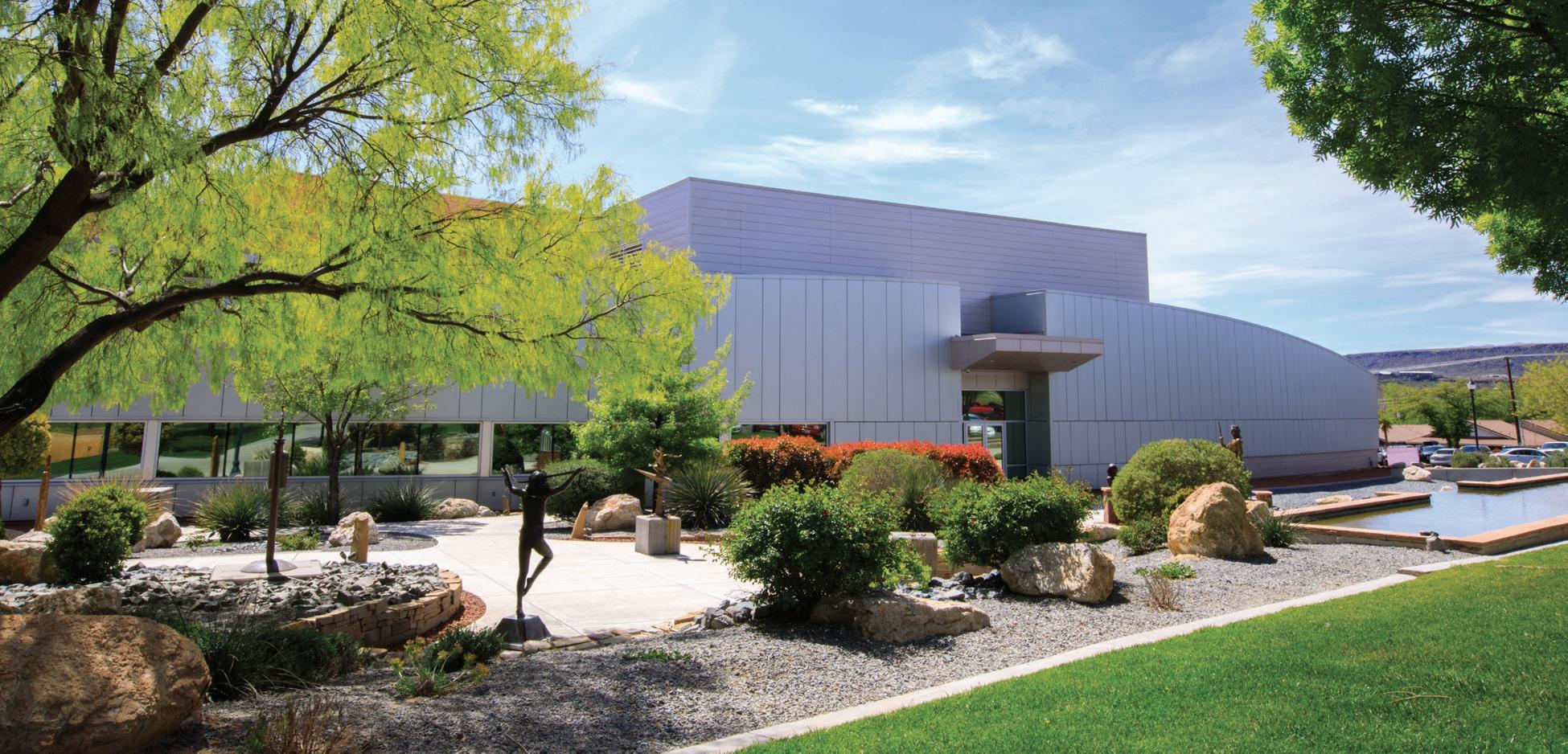
39 Academic Report 2019 | Dixie State University
FACULTY RECOGNITION, PUBLICATIONS AND RESEARCH
DR. VERL ANDERSON , Professor of Business Management, has published 34 journal articles in peer-reviewed international academic journals in the past 4 years and has published four academic textbooks in the past two years. The textbooks include Human Resource Management–a Transformative Approach published by Nova in 2018; Humility as Enlightened Leadership published by Nova in 2018, Strategic Human Resource Management published by NOVA in 2018; Competitive Advantage: Strategies, Management, and Performance published by NOVA in 2017. He won the Walden University Faculty Excellence Award for the College of Management and Technology in 2018. He serves on the editorial board of these journals: International Journal of Trends in Economics, Management & Technology, International Journal of Public Leadership, Archives of Business Administration and Management, and Technological and Economic Development of Economy Journal.
DR. WILLIAM CHRISTENSEN, Professor of Business Management, co-authored “Creativity and Innovation,” Chapter 7 in Competitive Advantage: Strategies, Management and Performance published by Nova Science in 2017. He co-authored “Innovation,” Chapter 10 Strategic Management in the 21st Century, vol. 2 published by Praeger in 2013.
DR. JARED DUPREE, Associate Professor of Communication, co-authored “Evaluating Scholarship Productivity in COAMFTEAccredited Doctoral Programs: An Update” in Journal of Marital & Family Therapy in 2018. He co-authored Introduction to Business with Kendall-Hunt in 2016. He authored WholeFIT: Wellness for Life with Cedar Forte in 2015. He co-authored “Developing Culturally Competent Marriage & Family Therapists: Guidelines for Working with Asian American Indians” in American Journal of Family Therapy in 2013.
DR. KRISTY GRAYSON, Assistant Professor of Marketing, co-authored “Preliminary Assessment of the Ignatian-Centered DBA Program: Building the Next Generation of Ignatian Educators” in Journal of Jesuit Business Education in 2018. She authored a dissertation entitled “Employee-Based Brand Equity and Word-of-Mouth Product Referrals” for Creighton University in 2018.
DR. SHANDON GUBLER , Associate Professor of Business Management, won the Distinguished Teaching Award from DSU in 2018.
DR. ABU KHAN , Assistant Professor of Accounting and Finance, co-authored “Efficiency, Diversification, and Performance of Financial Institutions” with Kabir Hassan and Neal Marony, under review at International Review of Economics and Finance Jour nal. The essay won the best paper award in Financial Markets and Institution category at SWFA 2015. He co-authored “Does Ethics Improve Stock Market Resilience in Times of Instability?” in the Journal of Economic Systems in 2017. He co-authored “Efficiency Value Addition and Performance of US Bank Merger” with Elias Erragragui and Kabir Hassan in Journal of Corporate Ownership and Control in 2016. He won DSU’s Teacher of the Year—Rising Star Award in Spring 2018.

40 dixie.edu | active learning. active life.
COLLEGE OF BUSINESS &
COMMUNICATION
DR. SCOTT LINDSEY, Associate Professor of Business, co-authored “Focus and Efficiency in Healthcare Operations: An Empirical Study” in Journal of Operations Management (Under Review) in 2018.
DR. TRAVIS M. SEEGMILLER, SR. , Associate Professor of Business, serves as a State Representative for the Utah State House of Representatives. He serves on the Legislature’s Business & Labor Committee overseeing the future of Business Law in Utah; the Government Operations Committee; the interim Committee on Revenue & Taxation; the Judiciary Committee; and the Appropriations Committee overseeing the budgets for all of the state’s Social Services initiatives. He serves as Board Member and Trustee, Intermountain Foundation (IHC), Dixie Regional Medical Center; Advisory Board Member, State Bank of Southern Utah, and Managing Director in Residence of The Executive Leadership Institute at Dixie State University.
DR. KYLE WELLS, Dean of the College of Business & Communication, co-authored Business: Real World Applications with Al Keller and Jared DuPree published by Kendall Hunt in 2015. He co-authored “Do Leases Expand Debt Capacity” with James Schallheim and Ryan Whitby in Journal of Corporate Finance , Vol. 23 in 2013. He co-authored “A New Measure for Nondebt Tax Shields and the Impact on Debt Policy” with James Schallheim, University of Utah, and Madhuparna Kolay, Oregon State University (under review at the Journal of Banking and Finance).
COLLEGE OF EDUCATION
DR. ADRIANA BRANDT, Assistant Professor and Department Chair of Education, co-authored “Building Our Professional Capacity” in The Language Educator in 2018. She co-authored “Foreign Language Learning in K-12 Classrooms in the United States” for the Encyclopedia of Language and Education, Second and Foreign Language Education , 4th ed. in 2016. She co-authored “Using Assessment to Help Learners and Programs Grow” for Languages and Learners: Making the Match, 5th ed. in 2014.
DR. CHELSEA MCCRACKEN, Assistant Professor of Interdisciplinary Arts and Sciences, authored A Grammar of Belep with Mouton in 2019. She serves as Senior Research Analyst for the Coalition for Responsible Home Education.
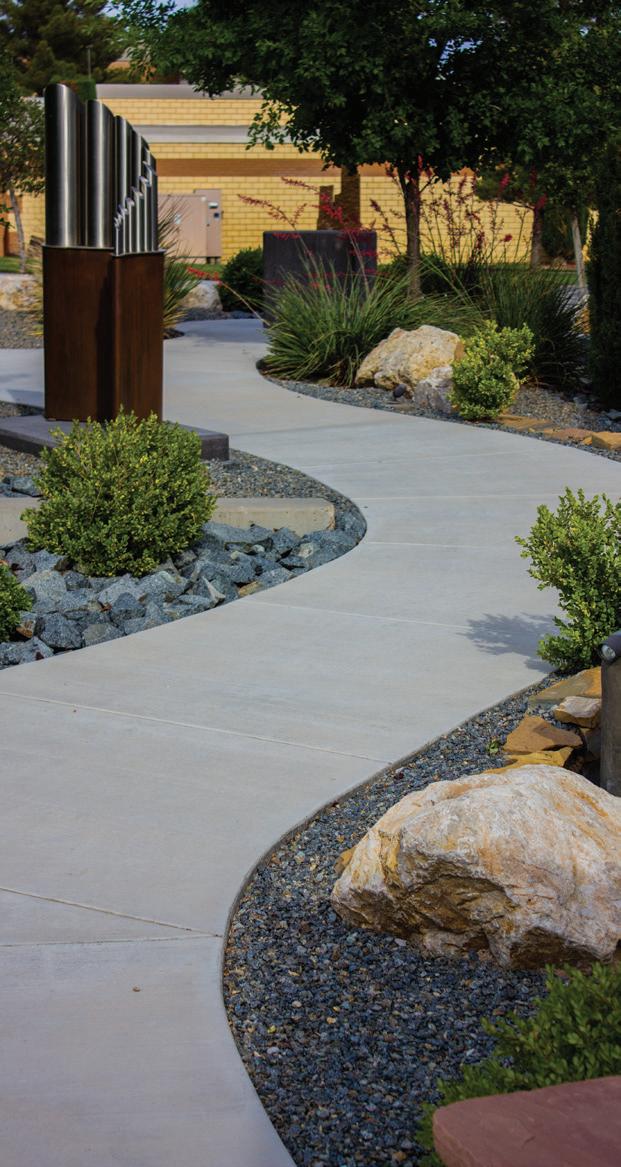
DR. NANCY ROSS , Assistant Professor of Interdisciplinary Arts and Sciences, has more publications than it is possible to list here. For example, she is co-author of Where We Must Stand: Ten Years of Feminist Mormon Housewives for Amazon CreateSpace in 2018 as well as “Finding the Middle Ground: Negotiating Mormonism and Gender” in Voices for Equality: Ordain Women and Resurgent Mormon Feminism for Greg Kofford Books in 2015. She co-authored “Mormon Feminists in Social Media: A Story of Community and Education” in Voices for Equality: Ordain Women and Resurgent Mormon Feminism for Greg Kofford Books in 2015. She co-authored “Mormon Feminist Perspectives on
the Mormon Digital Awakening: A Study of Identity and Personal Narratives” in Dialogue: A Journal of Mormon Thought in 2014.
DR. JEFF YULE, Associate Professor of Interdisciplinary Arts and Sciences, authored “Addressing Concerns about Extinction and Biodiversity by Moving beyond Biology,” a lead review of Ursula K. Heise’s Imagining Extinction: The Cultural Meanings of Endangered Species in Quarterly Review of Biology in 2017. He co-authored “A Review and Synthesis of Late Pleistocene Extinction Modeling: Progress Delayed by Mismatches between Ecological Realism, Interpretation, and Methodological Transparency” in Quarterly Review of Biology in 2014.
41 Academic Report 2019 | Dixie State University
FACULTY RECOGNITION, PUBLICATIONS AND RESEARCH
COLLEGE OF HEALTH SCIENCES
BRENDA ARMSTRONG, Assistant Professor of Dental Hygiene, authored “Anatomy and Physiology,” Chapter 3 of Darby’s Comprehensive Review of Dental Hygiene, 8th ed. with Elsevier in 2016. She won Utah Dental Hygienists’ Association Outstanding Student Mentor for 2018. She was a DSU College of Health Sciences Distinguished Faculty Service Nominee in 2017 & 2018. She served as Chair Elect for Utah Oral Health Coalition 2017–2018 and as chair for the organization for 2018–2019. She served as Utah Dental Hygienists’ Association Utah State Delegate from 2015-2018.
DR. MACEY BUKER , Assistant Professor of Population Health, co-authored “Curriculum Evaluation & Improvement Model” in The Journal of Health Administration Education in 2018. He co-authored “Adding Value to Your Program through Improved Student Selection” in The Journal of Health Administration Education in 2017. He authored “Memorial Hospital and Changes Related to Accounting for Leases” in Journal of Critical Incidents in 2016. He is a member of the following organizations and committees: ACHE, AUPHA, AUPHA Finance Committee, and HMFA Membership Committee.
CARA CALVO, Associate Professor of Medical Laboratory Sciences, served as National Accrediting Agency for Clinical Laboratory Science, Accreditation Site Inspection Team Leader from 2016–2018.
DR. TRAVIS FICKLIN , Assistant Professor of Health and Human Performance, has an extensive publication list, not all of which are listed here. He co-authored “Vicon Validation of the Sawbones M.I.S. Knee in Mimicking an Intact and Compromised Anterior Cruciate Ligament” in Athletic Training and Sports Health Care in 2018. He co-authored “A Comparison of Base Running Techniques in Baseball, with Implications for Sliding into First Base” in Journal of Sport and Health Science in 2016. He co-authored “Swing Kinematics Described in Division I Female Softball Players” in The Sport Journal in 2015. He co-authored “Kinematics and Temporal Parameters of the Slap Hitting Technique in Division I Female Softball Players” in The Sport Journal in 2015.
JENNIFER HARRINGTON, Instructor of Nursing, co-authored “The Utah Nursing Assistant Core Curriculum Guide” in The Utah Nursing Assistant Registry, 1st edition in 2018. She was awarded Outstanding Achievement, Leadership in Nursing Education in Fall 2017 from Regis University. She serves as Faculty Adviser for the Utah Student Nurses Association. She serves as Graduate Nursing Student Mentor for Weber State University. She served as Curriculum Revision Committee Member for the Utah Nursing Assistant Registry.
DR. JOSEPH LOVELL, Assistant Professor of Recreation and Sports Management, authored “The Role of Youth Sports in Lifelong Health” in NRPA Book of Abstracts
in 2018. He authored “A Comparative Analysis of Wellness in Adulthood Based on High School Athletic Participation” in The International Journal of Sport and Society in 2017. He authored “Returning Youth Sports to the Kids” in Parks and Recreation Magazine in 2016. He won Outstanding Academic Professional, Utah Recreation and Park Association. He was a Moderator, NRPA Research Sessions – National Recreation and Park Association Conference and Expo in 2018. He is an Accreditation Site Visitor, Council on Accreditation for Parks, Recreation, Tourism, and Related Professions - National Recreation and Park Association.
DR. MICHELLE MCDERMOTT, Associate Professor of Nursing, authored her dissertation “Perceptions of Caring Behaviors in Associate Degree Male Nursing Students” in 2017. She serves as Co-Chairman Health Screenings-Huntsman Senior World Games..
DR. JOHN RASMUSSEN, Assistant Professor of Health Sciences, co-authored “Cytotoxicity of ZnO Nanoparticles Can Be Tailored by Modifying Their Surface Structure: A Green Chemistry Approach for Safer Nanomaterials” in ACS Sustainable Chemistry and Engineering in 2014.
JUDY A. SCOTT, Assistant Professor of Nursing, authored her dissertation “Nursing Students’ Service Learning Activities with Older Adults: Effect on Ageism” in 2018.
42 dixie.edu | active learning. active life.
LISA WELCH, Associate Professor of Dental Hygiene, co-authored “Oral Cancer Awareness Among Community-Dwelling Senior Citizens in Illinois” in Journal of Community Health in 2014. She authored two chapters in Clinical Practice of The Dental Hygienist with Wolters Kluwer Health/Lippincott Williams & Wilkins in 2017 entitled “Medical History Review” and “Blood Borne Diseases.”
DREW WILCOX, Assistant Professor and Program Director of Physical Therapy Assistant Program, authored “Community Movement” in PT in Motion in 2010. He serves as a Utah Physical Therapy Association Board Member. He served on the American Physical Therapy Association awards committee. He served as an American Physical Therapy Association PTA Caucus Delegate for 2018. He serves as a Utah PTA Delegate to APTA House of Delegates.
COLLEGE OF HUMANITIES & SOCIAL SCIENCES
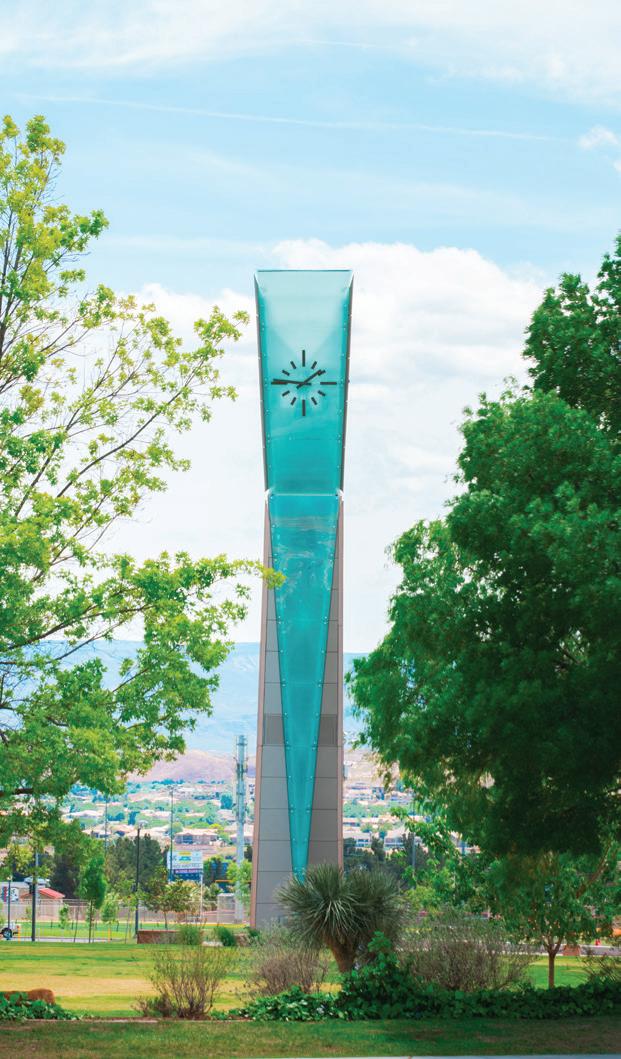
DR. STEPHEN ARMSTRONG, Professor of English, authored Paul Bartel: The Life and Films with McFarland in 2017.
DR. FLORENCE BACABAC , Associate Professor of English, has authored more publications than it is possible to list here, including “’We Write to Serve’: The Intersections of Service Learning, Grant Writing, and the Feminist Rhetorical Agency” for Composing Feminist Interventions: Activism, Engagement, Praxis, edited by Kristine Blair and Lee Nickoson, with University Press of Colorado/WAC Clearinghouse in 2019. She authored “Reviewing Conduct Books as Feminist Rhetorical Devices for Agency Reforms” in Peitho: Journal of the Coalition of Feminist Scholars in the History of Rhetoric and Composition in 2018. She authored “Critical Source Analysis: Revitalizing Research Within the Framework of Writing Across the Curriculum” in Journal of Teaching Writing in 2018. She was a Presidential Awardee for Community Engagement from DSU in 2018. She was a U-Rock Awardee, Utah Women in Higher Education Network DSU Chapter, 2018. She was Certified Outstanding Contributor in Reviewing from Computers and Composition and Elsevier in 2018. She serves a manuscript reviewer for Business and Professional Communication Quarterly, Journal of Business and Technical Communication, and Computers and Composition: An International Journal. She serves as an Asian Asian American Caucus Member for the National Council of Teachers of English and Conference on College Composition and Communication.
DR. BRAD BARRY, Professor of English, published two poems in the 2016 Route 7 Review: “creosote” and “neighbor hood”.
DR. SARAH BELL, Assistant Professor of Psychology, has more publications than it is possible to list here, including co-authoring “When, If, and How: Young Women Contend with Orgasmic Absence” in The Journal of Sex Research in 2017 and “Graduate Education in Qualitative Methods in U.S. Psychology: Current Trends and Recommendations for the Future” in Qualitative Research in Psychology in 2017. She co-authored “Sexual Desire in Sexual Minority and Majority Women and Men: The Multifaceted Sexual Desire Questionnaire” in Archives of Sexual Behavior in 2017 and “Defining Pleasure: A Focus Group Study of Solitary and Partnered Sexual Pleasure in Queer and Heterosexual Women” in Archives of Sexual Behavior in 2016. She co-authored “A Mixed Methods Study of Faculty Attitudes about Qualitative Research Methods in U.S. Psychology Graduate Programs,” a report submitted to the Executive Committee of the Society for Qualitative Inquiry in Psychology in 2015.
DR. CHERI CRENSHAW, Associate Professor of English, authored several articles published in Business Communication Quarterly: “Using Design Principles in Rhetorical Analysis of Business Documents” in 2018; “Scholarly Article Presentations in Business Communications Classes” in 2017; “Working with Graphics in Word: An In-Class Exercise” in 2015; “Completing a Usability Test: Can ‘Real Users’ Use Your Product?” in 2014, and “Designing Stand-Out Resumes Using ‘CARP’” in 2013.
43 Academic Report 2019 | Dixie State University
DR. JIM HAENDIGES, Associate Professor of English, authored “Composing Comic Books: Reflections on the Making of the Comic Book, ‘The Amazing Educational Struggle between Language and Literacy’” in Computers & Composition Online in 2015. He authored “Comic Books and the Rise of Visual Narratives in the Classroom” in Reimagining School Reform and Innovation with Sense Publishers in 2014. He serves as a Dixie Montessori Academy Board Member.
DR. CINDY KING, Assistant Professor of English, authored more poems than it is possible to list here, for example, “When Your Mother Asks If You’re Seeing Anyone and No Longer Means a Therapist” forthcoming in Watershed Review; “Little Oaths & Apologies” forthcoming in The Briar Cliff Review; “Survivor’s Guide to Grief, Loss, Bereavement, Life-Imploding Tragedies, and Various Other Kinds of Human Suffering (Abridged)” forthcoming in The Comstock Review; “Who’s with Me” forthcoming in The Windsor Review; “Agnostic Front” forthcoming in The Madison Review; “Warp & Weft: Surrender Betsy, Ms. Ross,” in descant 57 and “Clickbait Elegy” in The Sun. She won the Betty Gabehart Prize for Poetry, Fall 2018, University of Kentucky. She won the Original Writing Competition Award for Book-Length Poetry Manuscript, Fall 2018, Utah Division of Arts & Museums. She won a Writer’s Residency, Summer 2018, Stony Brook University/Southampton Writers Conference. She serves as a Blank Theatre Artistic Board Member.
DR. JOY MCMURRIN, Assistant Professor of English, authored her dissertation “Negotiating the Supermarket: A Critical Approach to Nutrition Literacy among Low-income Consumers” for Texas Tech University in 2016. She authored “Out of Time: A Double Feature on Expeditious Ethics” in Intercom: The Magazine of the Society for Technical Communicators in 2015. She received an honorable mention for Outstanding Dissertation Award in Technical Communication at the Conference on College Composition & Communication in 2018.
DR. SCOTT MILES, Assistant Professor of English as a Second Language, authored “Essential Reading 3” with Macmillan Education in 2016. He authored “Spaced vs. Massed Distribution Instruction for L2 Grammar Learning” in 2014. He authored “Getting Your First Journal Article Published” in TESOL Review in 2013. He authored “Reading All Over the World: Extensive Reading in Korea” in 2013. He has served as an Extensive Reading Foundation Board Member since 2010.
DR. KRISTINE OLSON, Associate Professor of Psychology, co-authored “The Fair Process Effect in the Classroom: Reducing the Influence of Grades on Student Evaluations of Teachers” forthcoming in the Journal of Marketing Education . She co-authored “Insecurity in the Ivory Tower: Direct and Indirect Effects of Budget Cuts, Pay Stagnation, and Job Insecurity on Faculty Performance” in Economic and Industrial Democracy in 2017. She co-authored “This is Our House!” Why Are I-Os Losing at the Gender Disparity Game?” in
Industrial and Organizational Psychology: Perspectives on Science and Practice in 2017. She co-authored “Gender Differences in Perceptions of Resources and Turnover Intentions of Work-Linked Couples in Masculine Occupations” in Stress and Health in 2017. She won the DSU Distinguished Professor Award in 2018. She serves as an Editorial Board Member for Industrial and Organizational Psychology: Perspectives on Science and Practice .
DR. ACE PILKINGTON , Professor of English and History, has more publications than it is possible to list here, for example, Opportunities and Perils of Technologies of the Future forthcoming from McFarland. He co-edited Lab Lit: Exploring Literary Fictions about Science with Olga Pilkington forthcoming from Lexington. In Lab Lit , he authored “Lab Lit and Science Fiction: Similarities and Separations,” “Science Fiction and the New Trek Timeline,” “Introduction: Toward a ‘Many Texts’ Theory of the Star Trek Multiverse,” and “Conclusion: Is There a Future for Star Trek?” He authored “Much Ado about Nothing & Pride and Prejudice: Twin Characters and Parallel Plots” in Much Ado About Nothing forthcoming from Layman Poupard Publishing for Gale/ Cengage Learning. He authored “Alex the Cat and Alex the Prince” in Paws, Claws, and Magic Tales: The Fellowship of Fantasy in 2018. He authored “Merry Wives of Windsor” in Midsummer Magazine in 2018. He is a Literary Seminar Director for the Utah Shakespeare Festival.
44 dixie.edu | active learning. active life.
FACULTY RECOGNITION, PUBLICATIONS AND RESEARCH
COLLEGE OF HUMANITIES & SOCIAL SCIENCES, continued
JOAN RUNS THROUGH, Digital Forensics Crime Lab Assistant Director, co-authored “Varying Instructional Approaches to Physical Extraction of Mobile Device Memory” in the Journal of Digital Forensics, Security and Law in 2017. She coordinated the Trade Adjustment Assistance Community College and Career Training Grant from 2013 to present.
DR. MATT SMITH-LAHRMAN, Professor of Sociology, authored The Meat Puppets and the Lyrics of Curt Kirkwood from ‘Meat Puppets II’ to ‘No Joke!’” with Roman and Littlefield Press in 2014.
DR. LUCIA TAYLOR, Assistant Professor of Spanish, authored “Ellas Opinan: Lucia Taylor Una Malamadre en Utah” for El Club de las Malas Madres in 2015. She authored “Pregnancy and Motherhood while on the Tenure-Track” for Conditionally Accepted in 2015. She serves on the American Council on the Teaching of Foreign Languages as a program reviewer for CAEP, on the American Council on the Teaching of Foreign Languages as a Conference Reviewer, on the Utah State Office of Education as a Oral Proficiency Examiner, on the Utah Foreign Languages Association as a Board Member, and on UFLA and on the Dual Language Immersion Bridge Project as a Board Member.
DR. SHAUNA WIGHT, Assistant Professor of English, authored “Literacy Sponsorship in Upward Bound: The Impact of (De) segregation and Peer Dynamics” in Resident Multilingual and Linguistic Minority Students’ Transitions from High School to College with Routledge in 2016. She authored “Admitted or Denied: Multilingual Writers Negotiate Admissions Essays” in The Journal of Adolescent and Adult Literacy in 2017. She co-authored “ESL Writing in Schools” in Handbook of Second and Foreign Language Writing with De Gruyter Mouton in 2016. She is co-chair of the Commission on Writing Teacher Education for the National Council of Teachers of English.
DR. JOHN WOLFE, Assistant Professor of Humanities, co-authored “Rise of the Necrofauna: The Science, Ethics, and Risks of De-Extinction,” a review of Rise of the Necrofauna: The Science, Ethics, and Risks of De-Extinction by Britt Wray, with Jeff Yule, in The Quarterly Review of Biology in 2018.
DR. BARRY WOOD, Assistant Professor of Humanities, has authored more publications than it is possible to list here, including The Adventures of Shah Esmā’il: A SeventeenthCentury Persian Popular Romance with Brill in 2018 and “Architectural Inscriptions in

Early Safavid Paintings in the Metropolitan Museum” in Metropolitan Museum of Art Journal in 2018. He authored “The Battle of Chālderān: Official History and Popular Memory” in Iranian Studies in 2017 and “The Safavid Foundation Myth in the Subaltern Imagination” in Recovering “Lost Voices”: The Role and Depiction of Persianate Subalterns during the Safavid and Afsharid Periods forthcoming from Routledge.
DR. THEDA WREDE, Professor of English, authored the introduction to Special Issue: Theorizing Space and Gender in the 21st Century in Rocky Mountain Review in 2015. She authored Myth and Environment in Recent Southwestern Literature: Healing Narratives with Lexington Books in 2014. She authored “Barbara Kingsolver’s Flight Behavior: The Sciences in a Post-Fact World” in Lab Lit: A Critical Anthology for Lexington Books in 2019 (under review).
DR. JEREMY C. YOUNG, Assistant Professor of History, authored The Age of Charisma: Leaders, Followers, and Emotions in American Society, 1870–1940 with Cambridge in 2017. He serves as Membership Secretary, Society for Historians of the Gilded Age and Progressive Era. He serves as H-SHGAPE Listserv Editor, Society for Historians of the Gilded Age and Progressive Era.
45 Academic Report 2019 | Dixie State University
COLLEGE OF SCIENCE, ENGINEERING & TECHNOLOGY
DR. BONNIE BAIN, Adjunct Professor of Biology, co-authored “Helobdella blinni sp. n. (Hirundinida, Glossiphoniidae) a New Leech Species Inhabiting Montezuma Well, Arizona” in ZooKeys in 2017. She co-authored “Images Are Not and Should Not Ever Be Type Specimens: A Rebuttal to Garraffoni and Freitas” in Zootaxa in 2017. She co-authored Chapter 12, “Phylum Annelida, Class Clitellata, Subclass Oligochaeta” in Keys to Nearctic Fauna, Thorp and Covich’s Freshwater Invertebrates, Vol. II, 4th ed. with Elsevier in 2016. She co-authored “Hands-On Laboratory Simulation of Evolution: An Investigation of Mutation, Natural Selection, and Speciation, American Biology Teacher” in 2014.
DR. VINODH KUMAR CHELLAMUTHU, Assistant Professor of Mathematics, co-authored “Superlinear Convergence Via Mixed Generalized Quasilinearization Method and Generalized Monotone Method” in Involve, a Journal of Mathematics in 2014. He co-authored “Finite Difference Approximation for Measure-Valued Solutions of a Hierarchically Size-Structured Population Model” in Mathematical Biosciences and Engineering in 2015. He co-authored “A Model for the Interaction of Frog Population Dynamics with Batrachochytrium dendrobatidis, Janthinobacterium lividum and Temperature and its Implication for Chytridiomycosis Management” in Ecological Modelling in 2016. He is an Editor for the Department of Education & Research, International Digital Library; an Appointed Member for the Mathematical Association of America
Council on Publications and Communications; an Editorial Board Member for the SCIREA Journal of Information Science and Systems Science; and an Editorial Board Member for SCIREA Journal of Mathematics . He is a reviewer for MDPI Journals, Applied and Computational Mathematics, and Journal of the Mathematics Research He is a Member of the International Scientific Committee and Editorial Review Board, World Academy of Science, Engineering and Technology.
DR. RICO DEL SESTO, Associate Professor of Chemistry and Department Chair of Physical Sciences, has authored more publications than it is possible to list here; for example, he co-authored “Investigations into the Scope, Efficacy and Antimicrobial Mechanism of the Broad-Spectrum Antiseptic Choline Geranate” in ACS Infectious Diseases submitted in 2018. He co-authored “Unprecedented Magnetic Behavior in Lanthanide Based Ionic Liquids” in Chemical Communications in 2017. He co-authored “Biphasic Extraction, Recovery and Identification of Organic and Inorganic Compounds with Room Temperature Ionic Liquids” in Ionic Liquids: Current State and Future Directions, ACS Symposium Series 1250 in 2017. He co-authored “Choline and Geranate Deep Eutectic Solvent as a Broad-spectrum Antiseptic Agent for Preventive and Therapeutic Applications” in Advanced Healthcare Materials in 2016. He is co-Founder and co-Organizer of the SG BioTech Coalition.
DR. MARTINA GASPARI, Assistant Professor of Biological Sciences, co-authored “Human Telomerase RNA Processing and Quality Control” in Cell Rep in 2015.
JESSE HICKS , Assistant Professor of Mathematics, authored a dissertation entitled “Classification of Spacetimes with Symmetry” in 2016. He authored “The Riemann Curvature Tensor, Its Invariants, and Their Use in the Classification of Spacetimes” in 2015.
DR. ZHENYU JIN, Assistant Professor of Geography, authored “Landscape Change Detection Using GIS and Remote Sensing: A Study on St. George” in 2018. He co-authored “Empirical Comparison of Noise Reduction Techniques for NDVI Time-series Based on a New Measure” in ISPRS Journal of Photogrammetry and Remote Sensing in 2018.
DR. ERIN O’BRIEN, Professor and Chair of Biological Sciences, serves as a Memberat-large for the Utah Academy of Sciences, Arts, and Letters Board. She also serves as Councilor for the Council on Undergraduate Research, Biology Division.
DR. BUNA SAMBANDHAM, Assistant Professor of Mathematics, co-authored “Basic Results for Sequential Caputo Fractional Differential Equations” in Mathematics in 2015. She co-authored “Numerical Results for Linear Caputo Fractional Differential Equations with Variable Coeffecients and Applications” in Neural, Parallel, and Scientific Computations in 2015. She co-authored “Laplace Transform Method for Sequential Caputo Fractional Differential Equations” in MESA in 2016. She co-authored “Generalized Monotone Method for Sequential Caputo Fractional Boundary Value Problems” in Journal of Advances in Applied Mathematics in 2016. She co-authored “Generalized Monotone Method
46 dixie.edu | active learning. active life.
RECOGNITION,
FACULTY
PUBLICATIONS AND RESEARCH
for Sequential Caputo Fractional Boundary Value Problems with Numerical methods, (In Preparation)” in 2018. She co-authored “Numerical Methods for Caputo Fractional Differential Equations using Laplace Transform Methods” (In Preparation) in 2018. She is Second Vice Chair for the Mathematical Association of America, Intermountain Section. She is the Project Next Fellow for the Mathematical Association of America. She is the Founder of the Association for Women in Mathematics, Student Chapter, at DSU.
DR. WENDY SCHATZBERG , Assistant Professor of Chemistry, co-authored International Perspectives in Chemistry Education with ACS Press in 2018. She authored Physical Chemistry I and II Laboratory Manuals for Dixie State University in 2017. She authored General Chemistry I and II Laboratory Manuals for Dixie State University in 2015. She co-authored Identifying Chemistry Laboratory Safety Conceptions for the National Association for Research in Science Teaching in 2011. She is the Committee Chair for American Chemical Society, International Relations. She is a symposium organizer for the ACS National Meeting. She is an ETS Advanced Placement Chemistry Reader and Question Developer. She is a MultiState Collaborative University Assessment University and State Leader. She is an ACS Chemistry Education International Committee Member. She is a Chemistry Education Programming Committee Member. She is an article reviewer for NARST and ACS Journal of Chemical Education.

DR. GEOFFREY SMITH, Assistant Professor of Biology, authored more publications than it is possible to list here; for example, he co-authored Life-History Differences Across a Latitudinal Gradient in Common Side-Blotched Lizards (Uta Stansburiana), in review, in 2018. He co-authored “Demographic and Temporal Variations in Immunity and Condition of Polar Bears (Ursus Maritimus) from the Southern Beaufort Sea” in Journal of Experimental Zoology in 2017. He co-authored “Physiological Trade-offs in Lizards: Costs for Individuals and Populations” in Integrative and Comparative Biology in 2017. He co-authored “Metabolic Responses to Immune Challenges: Reevaluating the Energetics of Immunity” in Journal of Comparative Physiology in 2017. He co-authored “Limited Physiological Consequences of Parasitic Infection in Side-Blotched Lizards” in Physiological and Biochemical Zoology in 2017.
DR. MCKAY SULLIVAN , Assistant Professor of Mathematics, co-authored “Twisted Logarithmic Modules of Lattice Vertex Algebras” in Transactions of the American Mathematical Society in 2018. He co-authored “Inhomogeneous Supersymmetric Bilinear Forms” in Contemporary Mathematics in 2018. He co-authored “Twisted Logarithmic Modules of Free Field Algebras” in Journal of Mathematical Physics in 2016. He co-authored “2-Recognizeable Classes of Leibniz Algebras” in Journal of Algebra in 2015.
47 Academic Report 2019 | Dixie State University
STAFF RECOGNITION, PUBLICATIONS AND RESEARCH
SYLVIA BRADSHAW, Director of Sponsored Programs, authored “No ERA? You’re Not Alone: Utilizing a Collaborative Purchase to Conquer the Price Point Woes” in National Council of Research Administrators, NCURA Magazine in 2018. She won the Inaugural National Scholarship Award, August 2018, National Council of University Research Administrators (NCURA).
JESSICA DAVIS, Director of Quantitative Literacy Completion, Mathematics, won DSU’s Staff Member of the Year - Rising Star in 2018.
DEBORAH DECKER, Assistant Director of Advisement, authored a book review for Enhancing Student Learning and Development in Cross Border Higher Education by Dennis C. Roberts and Susan R. Komives (Eds.) in 2017.
DR. BRUCE HARRIS, Associate Provost for Faculty Affairs, co-authored Leading and Managing e-Learning: What the e-Learning Leader Needs to Know with Springer in 2018. He co-authored “Incorporating Self-Regulated Learning Strategies in Online Courses” in Real Life Distance Education with Information Age Publishing in 2014. He received the Division of Distance Learning (DDL) Distance Education Book Award from the Association for Educational Communications and Technology, Division of Distance Learning. He serves as Chair for the Utah System of Higher Education Teaching & Learning Group
DR. NANCY HAUCK, Associate Provost for Community and Global Engagement, co-authored Utah Women in Leadership in Higher Education: Exploring Potential Barriers of Career Advancement (under review) in 2019. She co-authored Trailblazer Connections Course Evaluation (under review) in 2019. She is a Utah State Science Education Coordinating Committee Member and a 2010–2019 Utah Career & Technical Education Directors Member. She serves as both a USHE General Education Task Force Member and a USHE High Impact Practices Task Force Member.
RYAN HOBBS , Director of Digital & Extended Learning, serves as Utah Teaching Technology Council (UTTC) Chair-Elect, as a UEN Advisory Council Member, and as a USHE CAN-U Advisory Council Member.
KEITH R. KELSCH, Admissions Advisor/ Recruiter, authored The Political Optimist: The Restoration of Common Consent with Vision Impact in 2016.
TAMBER MCALLISTER, Women’s Swimming Head Coach, served as a CSCAA Awards Committee Member and a CSCAA Division II Women’s Award Committee Member.
KELLY PETERSON-FAIRCHILD, Dean of the Library, serves as NWCCU Peer Evaluator.
KIM SEAICH, Director of Payroll, won DSU’s Staff Member of the Year Award in 2018.
LESLIE TWITCHELL , Administrative Assistant for English, authored “Signs of Terror” for The Southern Quill in 2018. She authored “Letter to the Editor: Concealed Weapon Carriers on Campus Shouldn’t Equal Sense of Security” in Dixie Sun News in 2017.
DON WILLIE, Executive Director of the Technology, Innovation, and Entrepreneurship Center, serves as a board member for Utah Alliance for Economic Development and Emerging Leaders Initiative.
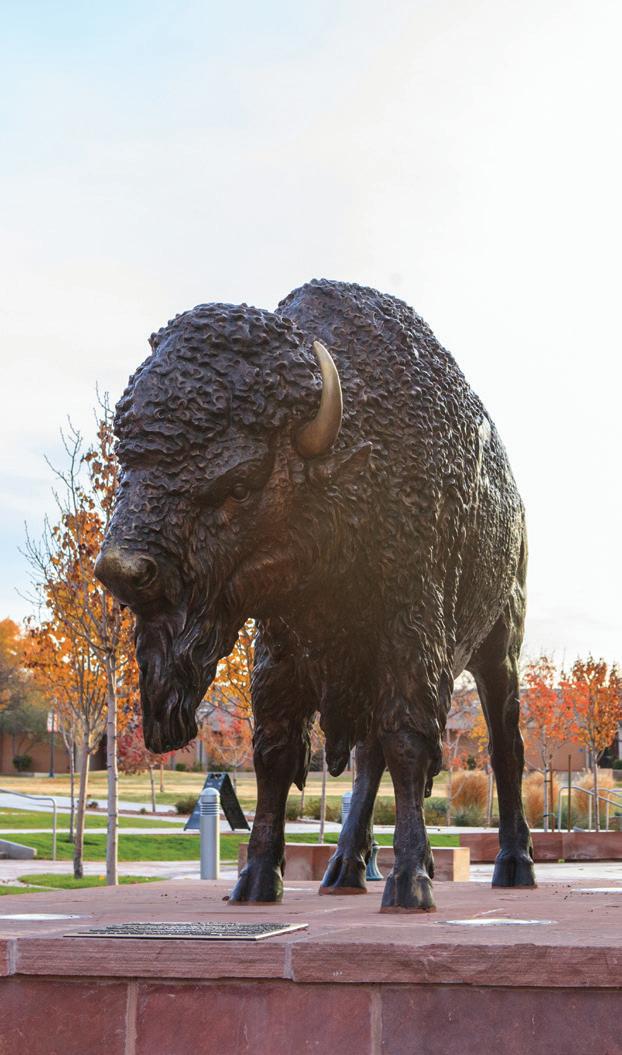
48 dixie.edu | active learning. active life.
Dr. Ace Pilkington: Prolific Scholar, Accomplished Director, Beloved English and History Professor
by Dr. Cheri Crenshaw, Interim Dean, College of Humanities & Social Sciences
The late Dr. Ace Pilkington, Professor of English and History, was a favorite instructor of DSU students for over 40 years and the literary seminar director at the Utah Shakespeare Festival at SUU for over 30 years. He was a loving husband and intellectual partner to Dr. Olga Pilkington, who is an Assistant Professor of English here at DSU and a frequent co-author in his scholarly work. He was a prolific, almost eclectic, scholar with publications on subjects ranging from Shakespeare to science fiction. His varied interests meant students loved his history classes as much as they loved his folklore classes. He made profound contributions to the university such as helping to establish The Southern Quill, DSU’s literary magazine, in its early years. His passing on February 20, 2019, leaves us with a sense of profound sadness.
His enthusiasm for teaching, his intelligence, and his humor are well known. Former student Leslie Twitchell says, “Dr. Pilkington was, without a doubt, one of my favorite professors. His love for history is what really drew me to his classes. His immense knowledge on the subjects he taught made class interesting, especially when he shared fascinating details about the lives of certain historical figures. He had a fantastic sense of humor and definitely had strong opinions about certain historical events and people, and students loved him for it. Dr. Pilkington's enthusiasm was contagious.”
Another former student, Braxton Thornley, describes Pilkington’s “mischievous grin” and the slow reaction to his humor. At first, Thornley says, students met the jokes “laced with a variety of punchlines built on folklore, Shakespeare, and sci-fi films” with little to no response. Thornley continues, “Undeterred, Dr. Pilkington would press on, his stories shoring up lectures and readings until, right around mid-terms, his students'
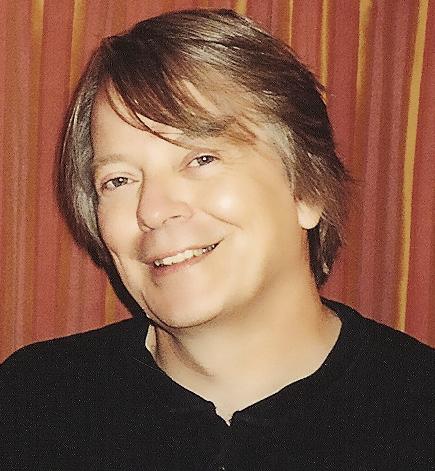
laughter would begin to follow his quips. Eventually, by the time finals began to approach, his jokes no longer were met with blank stares. [Students would] be laughing along with him.” Pilkington had an unmatchable charisma that translated into engaging learning experiences for students fortunate enough to take one of his classes.
His colleagues at DSU valued Pilkington as well, again mentioning his care for others and his humor. Dr. Brad Barry, Professor of English, says, “It always seemed that Ace was willing to stop what he was doing in order to have a conversation with anyone who stopped by his office. Though I only had a few conversations with Ace, he always seemed genuine, sincere, and thoughtful—and so often he was able to thread a bit of humor through any conversation.”
Other faculty describe similar positive experiences. For instance, Dr. Randy Jasmine, Professor of English, describes the time he attended the Utah Shakespeare Festival where Pilkington met with audience members at a discussion session regarding the previous night’s play. Jasmine says, “One of the audience members commented that she saw a certain character in the play in a certain way. Because it was a show and not an academic class, I thought Ace would say something like, ‘that is an interesting response.’ Instead, he explained to the woman why the response was off base, and he offered a more in depth interpretation. To my surprise, instead of being offended, the audience member enjoyed the interaction and told Ace, ‘You’re the reason we come here!’”
Ace Pilkington had a tremendous impact on his students, his colleagues, and on those who attended his plays. His classes were always full. He was a true favorite with students. He was a prolific scholar and a loving husband. DSU was a richer place for his presence. He has left a legacy of people who love Shakespeare, literature, and history more because he was once here. Twitchell sums up our loss well: “I will miss his positive energy, infectious laugh, and love of teaching.” And, so will we all.
51 Academic Report 2019 | Dixie State University
21:1 student-to-faculty ratio students enrolled 1911 Founded as St. George Stake Academy on Main Street Admitted to the Utah System of Higher Education 1935 1963 Moves to current campus 1923 Becomes Dixie Junior College 2019 2000 Begins offering 4-year degrees 2018 Approved to offer its first graduate program 2013 Receives university status from the Utah State Legislature 9,950 growth in academic programs since 1999 2 ,100% master’s degrees* 4 bachelor’s degrees* 45 associate’s degrees 11 degree emphases 67 of students are offered grants, scholarships, or financial aid international students 180+ #1 Utah’s most affordable university 84% * pending approval U.S. Postage PAID Non-Profit Org. PERMIT NO. 36 Provo, UT 225 South University Avenue St. George, UT 84770 435.652.7500 dixie.edu









 by Emily Mildenhall, Junior, English Major, Professional and Technical Writing Emphasis
by Emily Mildenhall, Junior, English Major, Professional and Technical Writing Emphasis




























